
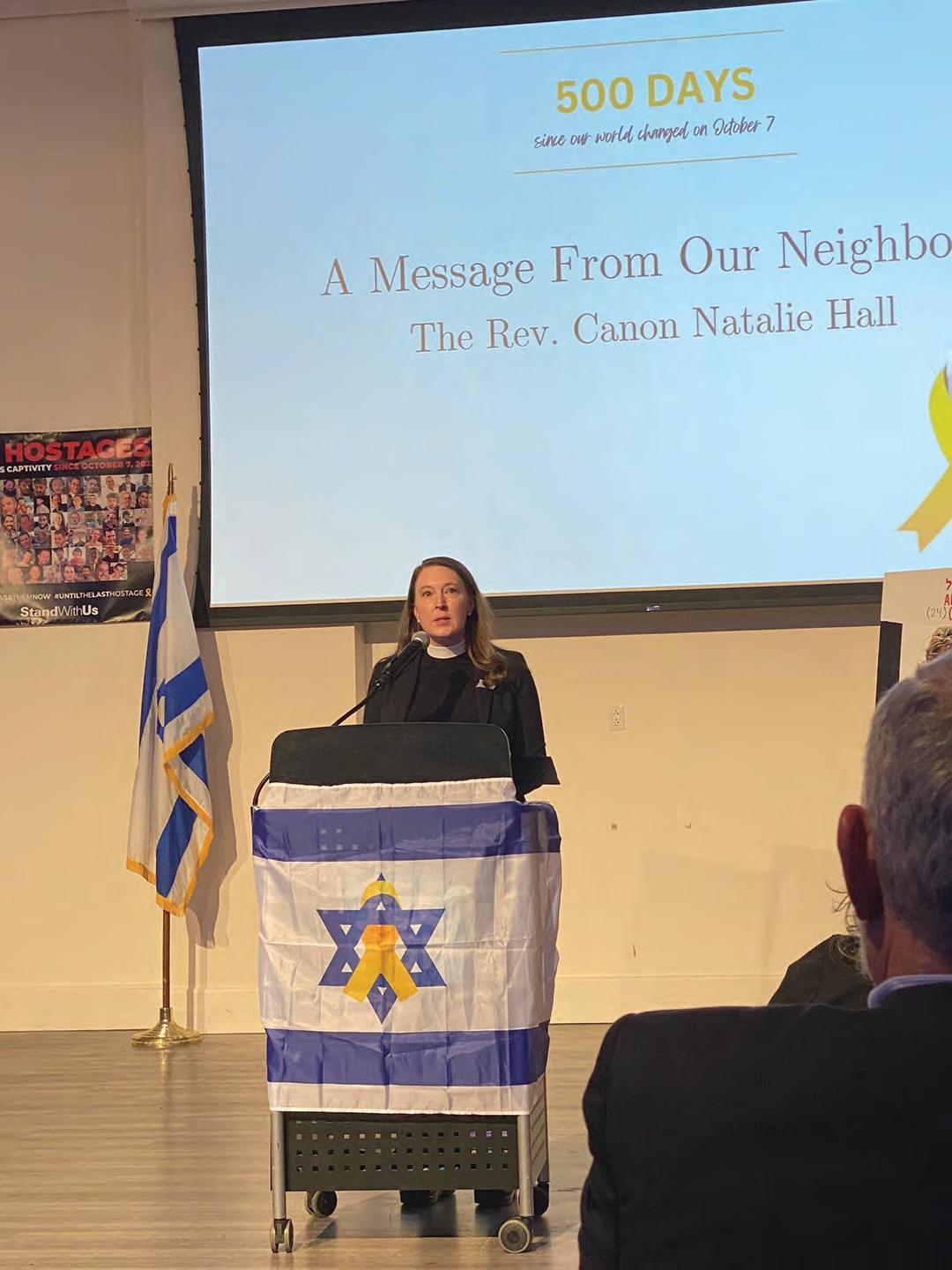



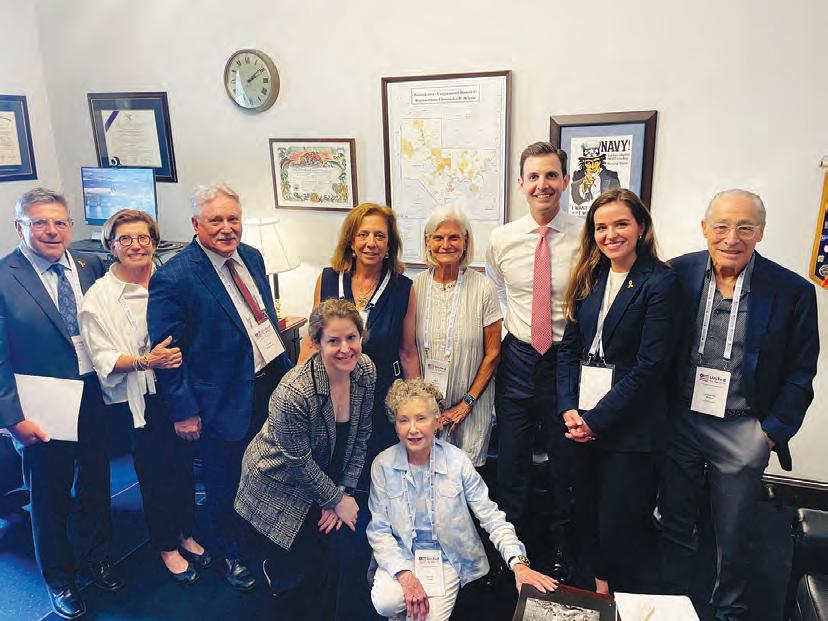

delegation of Pittsburghers joined with about 400 other concerned Jews from across the country in an emergency mission to Washington, D.C., to address surging antisemitism in the U.S.
The June 25-26 mission was organized by the Jewish Federations of North America and the Conference of Presidents of Major American Jewish Organizations. Nearly 100 Jewish communities sent delegations, representing 7.5 million Jewish Americans, according to JFNA officials. The delegates met with congressional representatives and their staff to discuss the mounting security needs of Jewish Americans.


The mission was organized as a response to a marked increase in violent antisemitic incidents in the U.S., including the June 1 firebombing in Boulder, Colorado, which resulted in one death and 13 people physically injured, and the May murders
of Israeli Embassy staffers Sarah Milgrim and Yaron Lischinsky in Washington, according to Laura Cherner, director of the Jewish Federation of Greater Pittsburgh’s Community Relations Council.
Convened around a “six-point plan,” the focus of the mission, Cherner said, was to pursue the support of elected officials for increased security funding for nonprofits; ensure houses of worship, schools and community centers have access to trained security personnel through federal support; strengthen the FBI and federal law enforcement’s ability to investigate and prevent hate crimes and domestic terrorism, with a particular focus on threats targeting religious communities; bolster support for state and local law enforcement so they can work in partnership with faith institutions to ensure safety; fully enforce existing hate

By Deborah Weisberg | Special to the Chronicle
Two western Pennsylvania teachers spent part of their summer in an intensive academic program aimed at enhancing Holocaust education in classrooms.
Hallie Leach of St. Therese School in Munhall, and Meg Frank of Riverside High School in North Sewickley Township are among 25 middle and high school teachers chosen from 10 states and Poland as 2025 Alfred Lerner Fellows by the Jewish Foundation for the Righteous.
As such, they participated in the Foundation’s recent Summer Institute for Teachers, a highlevel five-day course that covers new techniques for exploring the Holocaust with students.
Both women were nominated by the Holocaust Center of Pittsburgh and have spent more than a decade engaged in professional development around Holocaust learning through a variety of venues, including Classrooms Without Borders, which has taken them to Eastern Europe.
The Foundation seminar, in Newark, New Jersey, featured more than a dozen renowned Holocaust scholars and included lectures on antisemitism and anti-Judaism past and present.
“It was a very deep dive into a complex subject that is going to shape my teaching this fall,” said Frank, who teaches 11th and 12th graders. “I’ve studied the Holocaust for 10 years, and thought I knew it all, as teachers do. But I learned a lot more.”
Leach, a seventh and eighth grade teacher, came away from the seminar with 81 pages of notes and a new network of fellow educators committed to furthering Holocaust education


By David Rullo | Senior Staff Writer
If you were in downtown Pittsburgh last week, you may have noticed that the furries weren’t necessarily the most interesting attraction roaming the streets.
That’s because from July 2-5, at Heinz Hall, the city hosted the 2025 Beard and Moustache Championships. With it came a bevy of men with elaborately coifed facial hair ready to gain attention and win prizes in four different categories: Moustache, Partial Beard, Full Beard and Craft.
Each category has several sub-categories. Some of the more exotic names include the Dali Moustache, English Moustache, Fu Manchu, Alaskan Whaler, Musketeer and Garibaldi.
The competition, presented by Mad Viking Beard Club Pennsylvania, featured competitors from around the globe, including the 2024 world champion, Israel’s Haim Hoffman.
Since 2013, Hoffman has sported a shape known as the Imperial. It’s a highly stylized design, named after its progenitor, the last German Emperor Kaiser Wilhelm, in which the hair on either side of his face is grown long enough to cajole into an arc that is nearly as high as his head.
Hoffman spends about 20 minutes per side readying his facial hair, utilizing a variety of products and tools including brushes, hair dryers, mousse, wax and even a toothbrush.
That’s just for a competition, Hoffman said, noting that non-competition days don’t require the same amount of preparation.
“On normal days, it takes about 10 minutes a side,” he said.
Hoffman said he has competed in several
p Daniel Cohen (left) and Haim Hoffman competed for Israel at the 2025 World Beard and Moustache Competition in Pittsburgh.

countries, including England, Germany, Scotland and the U.S. The competitions, he said, range in size from smaller, regional events to large international competitions, like last week’s world championships.
The world championships, he noted, rotate every two years between Europe and the U.S. Hoffman was born in Germany to Polish Holocaust survivors who made aliyah to Israel. He eventually moved back to Germany before returning to Israel, where he works in the canteen of what he calls a “border control base.”
He started competing in 2012 and won several contests, securing reigns as the German champion, European champion and world champion.
Hoffman enjoys the competitions, he said, and the friendships he’s made along the way.
He would have to. The competitions are about the love of the sport. There are no cash prizes,
although once a competitor becomes known there is the opportunity for sponsorships.
“It’s a hobby,” he said. “It’s all for the glory and charity.”
This year, the Mad Viking Beard Club is donating a portion of each competitor’s $80 entry fee to the UPMC Children’s Hospital Foundation.
The Pittsburgh event wasn’t Hoffman’s first competition in America. In 2017, he took part in the championships in Austin, Texas.
This year, he was joined by Pittsburgh’s own Daniel Cohen, who has been competing since 2018. He and Hoffman are both part of Israel’s 972 beards club.
Cohen moved to Israel after growing up in the South Hills, where he attended the Conservative Beth El Congregation. He spent more than 10 years in Israel before returning to Pittsburgh.

SUBSCRIPTIONS
subscriptions@pittsburghjewishchronicle.org 412-687-1000, ext. 2
TO ADVERTISE advertising@pittsburghjewishchronicle.org 412-687-1000, ext. 1
EDITORIAL DEPARTMENT
Email: newsdesk@pittsburghjewishchronicle.org
BOARD OF TRUSTEES
Evan H. Stein, Chair
Evan Indianer, Vice Chair
Derek Smith, Treasurer
Gayle R. Kraut, Secretary
Gail Childs, Dan Droz, Malke Steinfeld Frank, Seth Glick, Tammy Hepps, Judith Kanal, Cátia Kossovsky, Charles Saul
GENERAL COUNSEL
Stuart R. Kaplan, Esq.
Jim Busis, CEO and Publisher 412-228-4690 jbusis@pittsburghjewishchronicle.org
EDITORIAL
Toby Tabachnick, Editor 412-228-4577 ttabachnick@pittsburghjewishchronicle.org
Adam Reinherz, Senior Staff Writer 412-687-1000 areinherz@pittsburghjewishchronicle.org
David Rullo, Senior Staff Writer 412-687-1000 drullo@pittsburghjewishchronicle.org
Andrew Rich, Staff Writer arich@pittsburghjewishchronicle.org
ADVERTISING
Amy Weiss, Account Executive (412) 613-0697 aweiss@pittsburghjewishchronicle.org
He credits his time in the Israel Defense Forces as influencing his decision to grow distinctive facial hair and joining the competition.
“I wasn’t allowed to have facial hair in the IDF. They took that away from me,” Cohen said. “So, I grew it out my first three months after I was out. I looked like a wolfman. Then I decided to take it more seriously.”
His first competition was in the European Open in Tel Aviv. Cohen sported what he called a Beard Verdi, which is a 10-centimeter stylized mustache.
“That was my introduction to the world of beard and mustache competition,” he said. “I saw an ad on Facebook two days before the event and decided to do it because it was for charity. From that point, I fell in love with it and the whole world of it. And now, I have the opportunity to represent Israel, after having lived there for a decade.”
Both Cohen and Hoffman said they’re proud to represent the Jewish state.
“It’s fantastic,” Hoffman said.
The pair may soon have the opportunity to share that national pride in Israel because there is a push to hold the championships there in 2028. And while Hoffman has grown his hobby, winning the highest echelon of titles, it’s still a thrill to be included among the mustached and bearded competitors.
“It’s fun to be in all these different competitions and to see the competitors from all over the world. It’s fun to be with them,” he said.
Hoffman’s joy was augmented at the conclusion of the 2025 competition when he became a two-time Imperial Partial Beard world champion. Cohen took fifth place in the English Mustache category. PJC
David Rullo can be reached at drullo@ pittsburghjewishchronicle.org.
5915 Beacon St., 5th Floor Pittsburgh, PA 15217
Main phone number: 412-687-1000
Subscriptions: 412-687-1000, ext. 2
PRODUCTION
Jeni Mann Tough Production Manager
Carl Weigel
Art/Production Coordinator
Subscriptions subscriptions@pittsburghjewishchronicle.org 412-687-1000, ext. 2
Published every Friday by the Pittsburgh Jewish Publication and Education Foundation 5915 Beacon St., 5th Floor Pittsburgh, PA 15217
Phone: 412-687-1000
POSTMASTER:
Send address change to PITTSBURGH JEWISH CHRONICLE, 5915 BEACON ST., 5TH FLOOR PITTSBURGH, PA 15217 (PERIODICAL RATE POSTAGE PAID AT PITTSBURGH, PA AND AT ADDITIONAL MAILING OFFICES)
USPS 582-740
Manuscripts, letters, documents and photographs sent to the Pittsburgh Jewish Chronicle become the property of this publication, which is not responsible for the return or loss of such items.
The Pittsburgh Jewish Chronicle does not endorse the goods or services advertised or covered in its pages and makes no representation to the kashrut of food products and services in said advertising or articles. The publisher is not liable for damages if, for any reason whatsoever, he fails to publish an advertisement or for any error in an advertisement. Acceptance of advertisers and of ad copy is subject to the publisher’s approval. The Pittsburgh Jewish Chronicle is not responsible if ads violate applicable laws and the advertiser will indemnify, hold harmless and defend the Pittsburgh Jewish Chronicle from all claims made by governmental agencies and consumers for any reason based on ads appearing in the Pittsburgh Jewish Chronicle

By David Rullo | Senior Staff Writer
It was a family trip to Florida that first moved Rabbi Daniel Fellman of Temple Sinai to organize a program focused on social justice.
“In Montgomery, we stopped in at the Equal Justice Initiative, and I was so moved by it, so blown away by it, that I thought to myself, ‘I’ve got to do something.’”
The desire to “do something” led to a partnership with Church of the Redeemer’s the Rev. Canon Natalie Hall and the creation of the interfaith study group “Justice and Freedom: God’s Story in Pittsburgh.”
A May 2026 joint trip that will include a bus ride from Atlanta to Birmingham is planned at the conclusion of the 11-session course.
Fellman said he and Hall had a specific goal as they planned the course and eventual trip.
“We decided it was a great opportunity to get people together to talk about justice issues,” he said.
The monthly classes are centered on the Hebrew Bible, many with guest speakers from across the social justice, religious and

political spectrums.
Hall said the emphasis on the Hebrew Bible was intentional.
“The Hebrew scripture is shared scripture,” she said. “I think studying the Hebrew scripture together, in depth, as a shared scripture, is critically important for what it means to consider freedom and justice — and justice in Pittsburgh.”
Beginning at a common starting point has helped foster a sense of unity, Fellman said.
“I think once the conversations unfold, commonalities come flying out,” he said.
“Getting everybody to sit down at the table and be willing to take this on requires a certain degree of effort, but once you get past that, overwhelmingly, it’s been a positive response.”
Hall is clear: Unanimity is not always the desired result. Instead, she said, the hope is that collegial and personal relationships will develop, allowing for the possibility of disagreement, while maintaining community and relationship, something she and Fellman are able to do.
“Just the simple act of gathering together as a diversity of people in a room to talk about significant, substantive things is a success in itself,” she said. “That’s a magnificent outcome.”
She hopes participants will develop relationships deep enough to enable them to determine when and where action is appropriate.
The idea, she said, is to discover where there are areas of pain, suffering or misunderstanding, so the group can work together and attempt to resolve those issues for the sake of justice.
And while the academic design of the course is worthwhile, Fellman said, the work outside the classroom also matters. To that end, he said, one of the first things they asked of the participants was to share contact information with each other and set up a time to talk beyond the classroom.

By Amelie Botbol, Akiva Van Koningsveld | JNS
The Israel Defense Forces had an alternative “shadow command” standing by during the 12-day war with Iran to ensure operational continuity if a counter-attack from Tehran took out the military’s command structure.
The “Shadow General Staff,” headed by Deputy Chief of Staff Maj. Gen. Tamir Yadai and staffed by generals in the reserves, was updated regarding the IDF attack plans and moved to a secret location ahead of the June 13 opening strike on Iran’s nuclear program, Hebrew media reported on Monday.
The shadow team, which was disconnected from the IDF’s regular communication infrastructure to prevent cyberattacks and physical intrusions of its base, was meant to be activated only in case of a complete loss of command, a scenario that did not materialize.
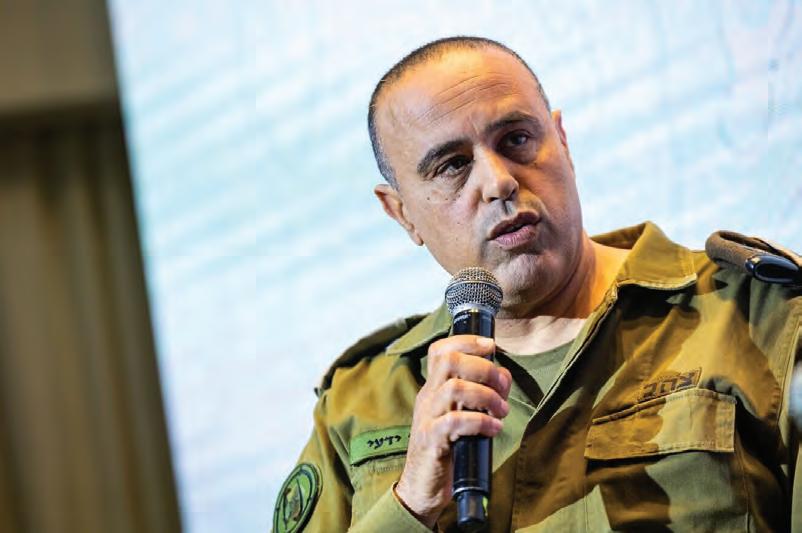
Azrieli Center shopping mall.
Ynet noted that some of the ballistic missiles and drones launched by the Islamic Republic over the course of the conflict targeted the Kirya military headquarters in Tel Aviv. In one instance, a projectile hit close to the nearby Da Vinci Towers and the
According to a report in the British Telegraph on Saturday, Iran’s ballistic missiles scored direct hits on five other military facilities in Israel.
Jerusalem’s opening strikes in Iran wiped out the country’s top military command, including the chief of staff of Tehran’s army, with additional senior military officials

killed during the subsequent 12 days of fighting.
Israel’s Channel 12 News channel reported last week that the Iranian regime had come “very close” to assassinating Defense Minister Israel Katz with the help of two Jewish Israelis who were arrested in April on suspicion of security-related offenses committed on Tehran’s behalf.
SUNday, JULy 20, 2025
Benny Gantz, leader of the opposition Blue and White Party and a former defense minister and IDF chief of staff, told JNS on Monday that Israel cannot permit the possibility of a penetration or invasion of its borders by Iran and its terrorist proxies.
“We have the intention and the means to stop such events from happening,” he declared, speaking at a faction meeting at the Knesset in Jerusalem.
Tehran “has to face the fact that another threshold was crossed, and if it operates against the State of Israel, Israel will know how to defend itself,” said the opposition member, adding, “And the Iranians definitely felt this.”
Yisrael Beiteinu Party leader Avigdor Liberman warned that the Islamic Republic “doesn’t stop for a moment” with its threats against Jerusalem.
“Everything they’re doing right now — talking, breathing — is about revenge,” Liberman told JNS. “They’re working at full throttle on rebuilding the nuclear program and also the ballistic missile program,” he said, stressing, “There’s no other issue in Iran besides revenge operations, including on Israel’s borders.
“This isn’t the end of the war. Everything happening with Iran is just a ceasefire,” the opposition politician warned. PJC
“Finding Our Fathers (and Mothers, too): The Joys and Pitfalls of Tracing Jewish Ancestors” with Dan Rottenberg 11am - 1pm/In-Person at the Rauh Jewish Archives at The Heinz History Center and Virtual on Zoom/$5
The mission of the Jewish Genealogy Society of Pittsburgh is to provide a means for our members and the community at large to reconnect with their Jewish ancestry in Southwestern Pennsylvania along with their ancestral homelands.
Dan Rottenberg, father of today’s Jewish Genealogy Movement.

Learn more about this and other upcoming programs at https://www.pghjgs.org/programming.
PGHJGS members attend all programs free, receive a monthly newsletter, and gain access to a member portal with recordings and resources from past programs.
By Asaf Shalev | JTA
Israel’s governing coalition is considering a bill that would significantly restrict who’s eligible for citizenship under the Law of Return, a foundational expression of Israel’s identity as a Jewish state.
The bill would eliminate a clause in the law that extends the right of citizenship to individuals who are not considered Jewish under religious law but have at least one Jewish grandparent.
An estimated 500,000 Israelis immigrated to the country since 1970 under this provision, which has become a source of contention within Israel and a point of friction with Jewish communities abroad.
A discussion on the bill was held Sunday at the Ministerial Committee on Legislation, which plays a critical gatekeeping role in Israel’s legislative process. The committee decided to debate the bill again next month.
The bill’s author is Avi Maoz, the far-right lawmaker from the Noam party, who in March quit Netanyahu’s coalition in protest of what he described as the government’s failure to advance a sufficiently Orthodox and nationalist agenda. The ministerial committee was also set to review a bill by Maoz to ban discussion of LGBTQ issues in classrooms.
Maoz and his allies argue that expanded eligibility for immigration serves to dilute
to the 2025 Reidbord Ehrenwerth Lecture

Israel’s Jewish character.
“In its current form, the Law of Return allows even the grandson of a Jew to receive immigrant status and rights, even if he himself, and sometimes even his parents, are no longer Jewish,” says an explanatory note attached to Maoz’s bill. “This situation means that the law is being exploited by many who have severed all ties with the Jewish people and its traditions, and in effect empties the law of its original intention, which was to open the country’s gates to the Jews of the Diaspora.”
Similar or identical bills have been introduced in recent years by other members of Netanyahu’s government, including fellow Likud party lawmaker Shlomo Karhi, Minister
of Finance Bezalel Smotrich and influential far-right politician Simcha Rothman, according to the explanatory note. Israel’s haredi Orthodox parties, which are also part of Netanyahu’s coalition, historically have opposed the “grandparent clause” as well.
Supporters of the grandparent clause say it upholds Israel’s identity as a refuge for anyone with Jewish ancestry, especially those excluded by Orthodox definitions.
The clause was added in 1970 partly in response to the Nazi Nuremberg Laws, which marked for persecution anyone with at least one Jewish grandparent.
Many also see the clause as critical for welcoming Jews from the former Soviet Union,

2025 7:00 PM Community Center
Squirrel Hill QUIRED D BY Y July y 25 Pittsburgh@zoa.org 639-1758
s and d ng g out t oney.” players, the broader freedom and as a
where decades of suppression left many unable to meet religious definitions but still connected, often deeply, to their Jewish heritage.
Under traditional halacha, or Jewish law, a person is considered Jewish only if their mother is Jewish, or if they formally convert to Judaism. Religious parties have also fought for years to reserve the authority for conversions to Orthodox rabbis.
In the Diaspora, there is strong support for maintaining the grandparent clause among major Jewish organizations and non-Orthodox movements, according to Stuart Weinblatt, a prominent Conservative rabbi and the chairman of the Zionist Rabbinic Coalition.
“I believe very strongly that issues such as security and borders should be decided by the sovereign democratically elected government of Israel, but there are other issues, which have an impact on Jewish peoplehood, which is worldwide, and it’s important to consider the wider consequences,” Weinblatt said.
He hopes those on the other side can come to see prospective immigrants as a boon to Israel rather than a threat, and find a way to embrace them despite the complications posed by religious law.
“There are people who have this connection to Judaism and the Jewish people, and instead of looking at closing the door, we should be welcoming them back into the fold, capitalizing on their desire to make their future in the homeland of the Jewish people,” he said. PJC
Invites you to the 2025 Kandy Reidbord Ehrenwerth Memorial Lecture
D BY Y July y 25
Email : Pittsburgh@zoa.org
Phone : 304-639-1758
Monday, July 28, 2025 7:00 PM
Jewish Community Center
“American n C Colle ges s and d Univer sities s ar e selling g out t st t Oil l Money.”
Squirrel Hill
No charge RSVP P REQUIRED D BY Y July y 25
Email : Pittsburgh@zoa.org Phone : 304-639-1758
Dr. Bard will explore the key players, the universities involved, and the broader implications for academic freedom and transparency through his lens as a
Mitchell Bard, PhD

C Colle ges s and d ar e selling g out t st t Oil l Money.”
Dr. Bard will explore the key players, the universities involved, and the broader implications for academic freedom and transparency through his lens as a foreign policy analyst.
Mitchell Bard, PhD
bord d Ehrenwerth

Kandy y Reidbord d Ehrenwerth
Dr. Bard will explore the key players, the universities involved, and the broader implications for academic freedom and transparency through his lens as a foreign policy analyst Mitchell Bard, PhD
advocate for justice, she was a Pittsburgh trial lawyer whose tragically cut short in a car accident hosts biennial program that lecture in her name, continuing spirit she embodied.
Kandy Reidbord Ehrenwerth
A fearless advocate for justice, she was a distinguished Pittsburgh trial lawyer whose life was tragically cut short in a car accident in 1992. ZOA hosts biennial program that features a lecture in her name, continuing the work and spirit she embodied.
Kandy y Reidbord d Ehrenwerth
A fearless advocate for justice, she was a distinguished Pittsburgh trial lawyer whose life was tragically cut short in a car accident in 1992. ZOA hosts a biennial program that features a lecture in her name, continuing the work and spirit she embodied.
A fearless advocate for justice, she was a distinguished Pittsburgh trial lawyer whose life was tragically cut short in a car accident in 1992. ZOA hosts biennial program that features a lecture in her name, continuing
Submit calendar items on the Chronicle’s website, pittsburghjewishchronicle.org. Submissions also will be included in print. Events will run in the print edition beginning one month prior to the date as space allows. The deadline for submissions is Friday, noon.
SUNDAY, JULY 13
Join the Pittsburgh Jewish community as we mark more than 21 months since Hamas’ Oct. 7, 2023, terrorist attack. Fifty people are still held in Gaza. We will gather to pray and advocate for their release. Noon. JCC Levinson Hall.
SUNDAYS, JULY 13–DEC. 28
Join Chabad of Squirrel Hill for its Men’s Tefillin Club Services and tefillin are followed by a delicious breakfast and engaging discussions on current events. 8:30 a.m. 1700 Beechwood Blvd. chabadpgh.com.
Join a lay-led online Parashah study group to discuss the weekly Torah portion. No Hebrew knowledge needed. The goal is to build community while deepening understanding of the text. 8:30 p.m. For more information, visit bethshalompgh.org/online-parashah.
MONDAYS, JULY 14-28
Join Chabad of Squirrel Hill for Torah and Tea. Learn from three inspirational messages for the three weeks of mourning. 7 p.m. Email caltein@chabadpgh.com for address. chabadpgh.com/tea.
MONDAYS, JULY 14–SEPT. 29
Join the 10.27 Healing Partnership for Roll for Insight: Community-Building Role-Playing Games. Meet every other week to connect and grow with new friends through playing tabletop role-playing games designed to inspire emotional depth. They will use RPGs to explore the intersection of identity, emotional resiliency and games to fight isolation and disconnection, and to meet new people and form friendships. Free. No experience required. 16 and up. 5:30 p.m. Jewish Community Center, 5738 Forbes Ave. 1027healingpartnership.org/rpg-club.
MONDAYS, JULY 14–DEC. 29
Join Congregation Beth Shalom for a weekly Talmud study. 9:15 a.m. For more information, visit bethshalompgh.org.
Join Temple Sinai for an evening of mahjong every Monday (except holidays). Whether you are just starting out or have years of experience, you are sure to enjoy the camaraderie and good times as you make new friends or cherish moments with long-term pals. All are welcome. Winners will be awarded Giant Eagle gift cards. All players should have their own mahjong cards. Contact Susan Cohen at susan_k_cohen@yahoo.com if you have questions. $5. templesinaipgh.org.
WEDNESDAYS, JULY 16–SEPT. 3
Join Rodef Shalom Congregation for Biblical Garden Open Door Tours: free, docent-led tours of the congregation’s Biblical Botanical Garden the first Wednesday of the month. 12:15 PM. 4905 Fifth Avenue. rodefshalom.org/garden.
WEDNESDAYS, JULY 16–DEC. 31
Temple Sinai’s Rabbi Daniel Fellman presents a weekly Parshat/Torah portion class on site and online. Call 412-421-9715 for more information and the Zoom link.
Bring the parashah alive and make it personally relevant and meaningful with Rabbi Mark Goodman in this weekly Parashah Discussion: Life & Text. 12:15 p.m. For more information, visit bethshalompgh.org/life-text.
THURSDAYS, JULY 17–JULY 31
Are you looking to incorporate mindfulness into your routine and make meaningful connections with others?
Join the 10.27 Healing Partnership for Open Morning Meditation. Engage in individual, quiet meditation for approximately 20 minutes, followed by approximately 20 minutes of group reflection, thoughts and warm community-building. Free; all experience levels, no registration required. 8 a.m. Jewish Community Center of Greater Pittsburgh, 5738 Forbes Ave., Room 316. 1027healingpartnership.org/open-morning-meditation.
FRIDAYS, JULY 18, AUG. 22
Gather in Rodef Shalom’s Biblical Garden for a 20s and 30s Kabbalat Shabbat. Get to know other young Jewish professionals and close out the week with apps, wine and great company. Registration required. 7 p.m. 4905 Fifth Ave. rodefshalom.org/lateshabbat.
Join Chabad of the South Hills for Baby Loves Shabbat, music and movement for ages 0 to 3. Challah making and Shabbat songs. 3:45 p.m. 1701 Bower Hill Road. chabadsh.com.
TUESDAY, JULY 22
Young children and their grown-ups are invited to join Rodef Shalom librarian Sam Siskind for a story in the Biblical Garden, followed by a crafty activity. 1:15 p.m. rodefshalom.org.
WEDNESDAY, JULY 23
Join the Jewish Community Center for Dave Wright Defensive Tactics Training for Seniors, a dynamic and confidence-building workshop designed specifically for older adults who want to take charge of their personal safety. In this hands-on session, trained instructors will guide participants through simple, yet e ective, selfdefense techniques tailored to di erent mobility levels. No prior experience needed. 1:30 p.m. Free. 345 Kane Blvd. jewishpgh.org/event/catt-seniors.
MONDAY, JULY 28
Join the Zionist Organization of America for the Kandy Ehrenwerth Memorial Lecture featuring Mitchell Bard presenting “American Colleges and Universities are Selling Out to Middle East Oil Money.” 7 p.m. Free, but reservations are required at pittsburgh@zoa.org. Jewish Community Center of Pittsburgh.
WEDNESDAY, JULY 30
Enjoy an hour of nourishment for the mind, body, and soul at Chabad of Squirrel Hill’s Ladies Lunch and Learn Explore words of the heart for the month of Av. Noon. $18. 1700 Beechwood Blvd. chabadpgh.com/lunch.
SUNDAY, AUG. 3


emailing drullo@pittsburghjewishchronicle.org.
TUESDAY, AUG. 5
Join the Jewish Federation of Greater Pittsburgh’s Young Adult Division in recognizing its lay leaders at Jewish Heritage Nightat PNC Park. Come out and bring a guest to celebrate your hard work serving the community over the last year. 5 p.m. $15. jewishpgh.org/event/jhnpirates.
FRIDAY, AUG. 8
Women are invited to bake and shape flower challahs at Chabad of Squirrel Hill’s Loaves of Love 10 a.m. $12. 1700 Beechwood Blvd. chabadpgh.com/lol.
SUNDAY, AUG. 17
Bring a friend and join Hadassah for its Evolve Kicko event, a fun afternoon of building a new Hadassah presence in Pittsburgh for women in their 20s to 50s. Enjoy a selection of pareve refreshments, learn about Evolve, and make new friends. 1 p.m. Address sent with registration. hadassah.org/get-involved/evolve-young-women.
FRIDAY, AUG. 22
Gather in Rodef Shalom’s Biblical Garden for a 20s and 30s Kabbalat Shabbat. Get to know other young Jewish professionals and close out the week with apps, wine and great company. Registration required. 7 p.m. 4905 Fifth Ave. rodefshalom.org/lateshabbat.
TUESDAY, SEPT. 9
Join StandWithUs for its Pittsburgh Community Reception. Speakers and honorees include keynote speaker Luai Ahmed, student honorees Miriam Levari and Harrison Romero, community honoree the Pittsburgh Jewish Chronicle and a conversation with Rona Kaufman. 5:30 p.m. Location given upon registration. standwithus.com/2025-pittsburgh-event.
SUNDAY, SEPT. 14











Join the Pittsburgh Jewish Chronicle book club on Zoom to discuss “Jerusalem: Drawn and Quartered: One Woman’s Year in the Heart of the Christian, Muslim, Armenian, and Jewish Quarters of Old Jerusalem” by Sarah Tuttle-Singer. The author will join us for the meeting. 1 p.m. Advance registration required by
The University of Pittsburgh Jewish Studies Program and Rauh Jewish Archives present O erings of Grief, O erings of Rage: Revisiting Tree of Life Synagogue and George Floyd Square. Laura Levitt will explore how people individually and collectively grieve after mass, public tragedies. Her talk will illustrate how the memorial items at the George Floyd and Oct. 27 memorials, when viewed together, can teach us about racism and antisemitism. 5 p.m. JCC Katz Auditorium, 5738 Forbes Ave. 1027healingpartnership.org/event/lauralevitt. PJC







Saturday & Sunday 9:30 a.m. to 2 p.m.
Starting July 19th
Cucina Alfabeto’s beloved brunch is back! From savory classics to sweet indulgences, enjoy a full brunch lineup paired with mimosas, Bloody Marys and a variety of handcrafted cocktails and mocktails. Mention this ad and receive 10% off your bill.



The Pittsburgh Jewish Chronicle invites you to join the Chronicle Book Club for its Aug. 3 discussion of “Jerusalem, Drawn and Quartered: One Woman’s Year in the Heart of the Christian, Muslim, Armenian, and Jewish Quarters of Old Jerusalem,” by Sarah Tuttle-Singer, who will join us for the meeting.
From Amazon.com: “On a night in 1999 when Sarah Tuttle-Singer was barely 18, she was stoned by Palestinian kids just outside one of the gates to the Old City of Jerusalem. In the years that followed, she was terri ed to explore the ancient city she so loved. But, sick of living in fear, she has now chosen to live within the Old City’s walls, right at the heart of the four quarters: Christian, Muslim, Armenian, and Jewish. ... ‘Jerusalem, Drawn and Quartered’ is a book for anyone who’s wondered who really lives in Israel, and how they coexist. It’s a book that skillfully weaves the personal and political, the heartwarming and the heart-stopping. It’s a book that only Sarah Tuttle-Singer can write. e Old City of Jerusalem may be set in stone, but it’s always changing.”
Your hosts
Toby Tabachnick, Chronicle editor
David Rullo, Chronicle senior staff writer
How it works
We will meet on Zoom on Sunday, Aug. 3, at 1 p.m.
What to do
Buy: “Jerusalem, Drawn and Quartered.” It is available from online retailers, including Amazon and Barnes & Noble. It is also available through the Carnegie Library system. Email: Contact us at drullo@pittsburghjewish chronicle.org, and write “Chronicle Book Club” in the subject line. We will send you a Zoom link for the discussion meeting. PJC
— Toby Tabachnick


Family of suspect in antisemitic firebombing in Colorado can be deported,
The federal government can deport Mohamed Sabry Soliman’s wife and five children, as the 45-year-old faces 12 federal hate crime charges, including two for first-degree murder, for allegedly firebombing Jews in Boulder, Colorado, last month as they marched in support of hostages in Gaza, a federal judge ruled, according to a JNS report.
Eight people were hospitalized due to the attack, and one died from her injuries.
“This is a proper end to an absurd legal effort on the plaintiff’s part,” stated Tricia McLaughlin, assistant secretary for Public Affairs at the U.S. Department of Homeland Security.
“Just like her terrorist husband, she and her children are here illegally and are rightfully in ICE custody for removal as a result,” McLaughlin stated. “This terrorist will be prosecuted to the fullest extent of the law. We are investigating to what extent his family knew about this heinous attack, if they had knowledge of it or if they provided support to it.”
The district court ruling reversed a prior one from a district court blocking the government from deporting the defendant’s family, the New York Post reported.
Soliman arrived in the United States from Egypt in 2022. He overstayed his visa and was later granted a work permit during
the Biden administration, according to the White House.
The Anti-Defamation League has laid off 22 employees, roughly 4% of its workforce, as part of an effort to focus its work more narrowly on antisemitism as it shifts away from broader civil rights and public policy work, according to the Forward.
Multiple departments were impacted but none were completely shuttered, ADL spokesperson Todd Gutnick said. Employees were laid off at the Center for Technology and Society and in the education department, which works on curriculum development related to antisemitism and other forms of discrimination in public schools, according to people familiar with the matter who spoke on the condition of anonymity.
The organization has set fundraising records in recent years, raising $163 million last year, according to Gutnick, compared to $55 million 10 years ago. It has also narrowed its focus and adopted a “strategic realignment” that Gutnick said calls for an emphasis on combating antisemitism in K-12 schools and at colleges and universities, through more forceful action than its longstanding educational programs entail, and responding directly to antisemitic incidents.
Jewish Currents reported in March that the organization had shut down its flagship anti-bias training program, called A World of Difference, which focused on identifying a broad array of discrimination.
July 14, 1958 — Coup ousts
Iraqi king
Items are provided by the Center for Israel Education (israeled.org), where you can find more details.
July 11, 1920 — WIZO is founded in London
Rebecca Sieff, Vera Weizmann and Edith Eder found the Women’s International Zionist Organization at a London conference. WIZO aims to provide child care, housing, schooling and other services in Palestine.
July 12, 1938 — Weizmann protests Britain’s pro-Arab stance
Chaim Weizmann complains to Malcolm MacDonald, the British secretary of state for dominion affairs, about the official shift from support for Zionism to a pro-Arab policy in the year since the Peel Commission’s call for partition.
July 13, 1978 — Peace deal is urgent, Sadat says Egyptian President Anwar Sadat invites Israeli Foreign Minister Ezer Weizman to a meeting in Austria t o press for a bilateral peace agreement. Sadat s ays Israel must withdraw from Sinai, Gaza and the West Bank.

The ADL was founded in 1913 to respond to antisemitism in the United States, but has long embraced a wider mandate and bills itself as “the leading anti-hate organization in the world” with a mission to “secure justice and fair treatment to all.”
But in recent years, and especially since the Israel-Hamas war began two years ago, the organization has found itself at odds with some historic partners in the civil rights community and CEO Jonathan Greenblatt has embraced a narrower focus on defending American Jews.
Greenblatt told a private audience of Republican state officials last month that the current rate of antisemitism was worse than any other form of hate that has occurred during the ADL’s 100-year history.
“I have never seen anything like this before, ever — ever,” he said.
Chicago man convicted of aiding ISIS, faces up to 130 years in jail
A 41-year-old Chicago man faces up to 130 years in prison after he was convicted of supporting the terror group Islamic State of Iraq and al-Sham by using social media to try to recruit members and to encourage attacks, the U.S. Justice Department said on June 27, according to a JNS report.
Ashraf Al Safoo, who was arrested in 2018, was a leader of the Khattab Media Foundation, a “sophisticated online organization that swore allegiance to ISIS,” the department said.
The foundation created and spread threats and ISIS propaganda via social media and other platforms, and it posted essays, infographics and other forms of media at the terror group’s direction, per the department.
Much of it “promoted violent jihad,”
the department said, including images of violence, celebrations of terror attacks and U.S. mass shootings and encouraging “lone wolf” attacks in the United States and other Western countries.
Acting Columbia president Claire Shipman apologizes for texts suggesting removal of a Jewish trustee
The acting president of Columbia University apologized to members of the school community last week after leaked text messages showed she had suggested the removal of a Jewish trustee, JTA reported.
“The things I said in a moment of frustration and stress were wrong. They do not reflect how I feel,” Claire Shipman wrote in a private email obtained by Jewish Insider and referring to an exchange that occurred before she was named acting president.
The apology comes after the House Committee on Education and Workforce sent a letter to Shipman lambasting her for leaked correspondences in which she criticized Shoshana Shendelman, a Jewish member of Columbia’s Board of Trustees and vocal critic of the university’s handling of antisemitism allegations.
Columbia faced intense pressure from the federal government to address allegations of discrimination by some Jewish and Israeli students.
In the messages, which were dated from 2023 and 2024, Shipman also separately suggested the appointment of an “Arab on our board.” PJC
— Compiled by Toby Tabachnick


Iraqi army officers overthrow and kill King Faisal. The Egyptian-Syrian union quickly signs a defense pact with the new Iraqi government, and Israel faces the danger of being surrounded by a Nasser-led multinational entity.
July 15, 1965 — Rabin warns neighbors not to divert Jordan IDF Chief of Staff Yitzhak Rabin warns Lebanon and Syria that they will face consequences if they move forward with an Arab League-backed effort to divert the sources of the Jordan River.
July 16, 1926 — Industrialist
Stef Wertheimer is born
Stef Wertheimer, one of Israel’s wealthiest citizens, is born in K ippenheim, Germany. He immigrates to Palestine in 1937 and founds Iscar Metalworking in 1952. Berkshire Hathaway eventually buys the company.
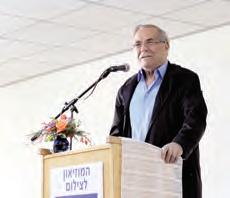
p Stef Wertheimer speaks at the opening of an exhibition at the Open Museum of Photography in Tel Hai in 2011.
By Moshe Milner,
July 17, 1888 — Nobel-winning author S.Y. Agnon is born
Author Shmuel Yosef “Shai” Agnon is born in Buczacz, Galicia, now in Ukraine. He makes aliyah in 1907. He receives the Nobel Prize in literature in 1966 for a body of work commemorating the shtetl life of Eastern Europe. PJC



friendly amenities if you plan to grow your family in your next home.
By Family Features
For those beginning the process of home buying, there are many factors to consider. Keep these ideas in mind as you conduct your search — whether it’s online or at a series of open houses.
Consider future needs
Because life is always evolving, it’s important to move into a home that has enough space for your family’s anticipated changes. While features and space are always prime considerations, don’t forget to look into the area schools, day care options, parks and other kid-
Look for flexible spaces
Seek homes that offer rooms with multiple functions. For example, an office area may be suitable for a small child’s room, or a sunroom may be converted to a laundry area down the road. Unfinished basements are also blank canvases that can be customized to meet your family’s wants and needs.
Get to know the area
The purchase of a home goes well beyond the property line. Be sure to examine the neighborhood in which the house is situated. From the condition of the neighbors’ houses to highway access and the proximity of necessities like grocery stores and gas stations, be sure to take every factor into account to help ensure you’re selecting the right location.



Kelly Meade Associate Broker Howard Hanna, Shadyside kmeade@howardhanna.com mobile: 412-389-2175
90 E. Woodland Road - $1,925,000


Stunning example of Mid Century modern architecture designed by renowned architect Tasso Katselas. Seamlessly integrating nature with contemporary living and offering easy access to surrounding city neighborhoods. This home's design embraces the natural landscape with expansive glass walls, organic materials and flowing layout that enhances indoor-outdoor living. 3 Bedroom, 3.5 baths, 2 car covered parking spaces.



By StatePoint
From updating an outdated kitchen to adding a home office, home renovations can be exciting. Before you dive in, it’s critical to understand the local safety requirements that impact your projects.
The International Code Council’s annual Building Safety Month campaign raises awareness about the role that building codes play in keeping us all safe and the important work done by building safety professionals, including those in your local building department. Kevin McOsker, the Code Council’s vice president of Technical Resources, offers advice to help you renovate safely:
First, meet with your local building department
Before beginning any home improvement project, you’ll want to meet with your local building department. They can walk you through the local building codes as well as the process for obtaining permits and inspections. Failing to meet the requirements outlined in the code can result in unsafe living conditions, failed inspections or costly rework.
To contact your local building department, start with your city or county’s official website and look for the building or planning

department. You can also call your city hall or visit in person.
Remember, building departments want to help make your project a success. Some building departments even have approved details and drawings to assist you with simple permits, construction and inspections.
When reaching out, ask:
• Do I need a permit for this type of work?
• How much does the permit cost?
• Are there specific code requirements in my area?
• How do I schedule inspections and when should they happen?

Next, secure a permit and inspection
A building permit is an official approval that allows you to proceed with a renovation or construction project. Permits are crucial because they ensure your project is safe and in compliance with local building codes and regulations. These regulations are designed to keep you safe from hazards inside the building as well as protect you from extreme weather events.
Skipping the permit process can lead to additional fees, stop-work orders or even complications when selling your home. In some jurisdictions, it may even be a misdemeanor offense that could carry significant fines.
Once you’ve secured a building permit, you’ll need an inspection. Building inspections are an official review of your renovation at key milestones during the construction process. They’re conducted by a certified professional to confirm that the work being done complies with local building code requirements.
• Skipping permits to save time or costs: Skipping permits often leads to greater expenses later if you’re fined, assessed additional fees or could even require you to redo completed construction work at your expense.
• Assuming minor changes don’t require approval: Even small updates can greatly impact safety and need permits and inspections.
• Hiring unlicensed contractors: They may not follow the code, have no license to perform the work and usually do not carry any insurance, which puts your project and your home at risk. Licensed contractors are accountable to the licensing board, just like your doctor.
• Failing to schedule necessary inspections: Without a final sign-off, your project may be considered incomplete, non-compliant or worse — create an unsafe condition.
Use building safety professionals as a resource
By working with your local building department, you can ensure your project meets standards, avoids legal issues and creates a safe space for everyone in your home. PJC





consistent prosecution of those who target religious institutions or individuals based on their faith background; and hold social media and digital platforms accountable for spreading antisemitism and extremism.
While in Washington, the Pittsburgh delegation, which included Federation volunteers and staff, met with Rep. Chris Deluzio (District 17).
“He’s been a good friend and supporter of the Jewish community, and really cares about safety and security and the rise in antisemitism,” Cherner said. “I think it was a productive meeting and a good engagement opportunity with him.”
The Pittsburgh delegation also met with staffers for Rep. Guy Reschenthaler (District 14), as well as staffers for Sen. Dave McCormick and Sen. John Fetterman.
They did not arrange to meet with the congresswoman representing Squirrel Hill, Rep. Summer Lee.
“The purpose was to connect with our members of Congress with whom there is already an existing relationship, who understand the issues and the rise in antisemitism,” Cherner said. “We know that those who do are going to be receptive
to our asks regarding the Nonprofit Security Grant Program” and other concerns.
The meetings were productive, Cherner said, particularly in terms of “being able
is like on Jewish Americans and Jewish Pittsburghers,” she said. “I think that definitely has an impact, to be able to connect with our changemakers and our
“We’ve faced a lot of challenges in Pittsburgh recently regarding antisemitism, threats of violence, the potential for antisemitic violence, and so it is important for the people who represent our communities to know what the impact is like on Jewish Americans and Jewish Pittsburghers."
–LAURA CHERNER
to share the experience of what antisemitism looks like in Pittsburgh, what we’ve been experiencing.”
“We’ve faced a lot of challenges in Pittsburgh recently regarding antisemitism, threats of violence, the potential for antisemitic violence, and so it is important for the people who represent our communities to know what the impact
even if it is not mandated by law in their states.
“A good teacher shares,” Leach said. “We’ve created an email chain and will continue sharing.”
Pennsylvania is among states that recommend, but do not require, Holocaust education in schools.
With approval from their schools’ administrators, Leach and Frank, who teach literature and English, developed Holocaust curricula, taking into account that most of their students start with little to no awareness of the genocide of Jews in World War II.
Both teachers use protocols developed by the United States Holocaust Memorial Museum in Washington, and work with the Holocaust Center of Pittsburgh to access speakers and other resources. They have taken their students on field trips, including to Violins of Hope, a traveling exhibition of instruments owned by Jews during the Holocaust, and the Keeping Tabs memorial at Community Day School in Squirrel Hill. Frank’s students have visited the U.S. Holocaust museum.
Required reading at both schools is extensive, and includes “Salvaged Pages,” a compilation of diaries of child and adolescent Holocaust victims by Alexandra Zapruder, one of the seminar lecturers.
“It’s hard to reach kids about an event that happened a long time ago, but when they read the words of kids the same age, it creates a connection,” Leach said.
She uses age-appropriate materials, and her syllabus at the start of the school year informs students that they are going to watch films like “I’m Still Here” and parts of “The Path to Nazi Genocide.”
While students are permitted to put their
heads on their desks or to take a walk if they find some images too disturbing, Leach said,
lawmakers on what that looks like in Pittsburgh.”
So far in 2025, Pittsburgh’s Federation has logged 183 local antisemitic incidents.
The delegation shared examples of antisemitic incidents in Pittsburgh, including those related to anti-Zionism following Hamas’ Oct. 7, 2023, brutal attack on Israel and the ensuing war. The delegates were able

express discomfort with course material, but feedback has been positive, she said. “The responses we get back are ‘Thank you for teaching this.’”
Because her students are Catholic, Leach makes a point of emphasizing their shared heritage with Jews, which makes the subject matter more relatable, she said.
“I talk about how our religion comes from the Jewish faith so we are not as different as students may think. My goal in teaching about the Holocaust is to make a better world where can all live together and not see each other as strangers.”
Frank’s objective in Holocaust education is similar in encouraging a broad humanitarian
to explain “in pretty much every one of our meetings” why some incidents cloaked in anti-Zionism cross the line into antisemitism, Cherner said.
DeLuzio, as well as the congressional staffers with whom the delegation met, understood the distinction, she added.
“I think one of the good things is that these members of Congress and their staff believe the Jewish community when we say we’re experiencing antisemitism,” she said.
The Jewish community is “facing an unprecedented situation in American Jewish history where every Jewish institution and event is a potential target for antisemitic violence,” Eric Fingerhut, president and CEO of the Jewish Federations of North America, said in a prepared statement. “Our Jewish communities and our local law enforcement partners are bearing extraordinary costs to secure our community and enable us to exercise our basic right to gather as Americans for religious and cultural activities. This is domestic terrorism, plain and simple, and defeating this campaign of terror is the responsibility of government.”
PJC
Toby Tabachnick can be reached at ttabachnick@pittsburghjewishchronicle.org.
and antisemitism is limited, she said, noting that she has had one, non-practicing Jewish student in all the years she has been teaching. Like Leach, she uses an immersive teaching approach, with books such as “Number the Stars,” Anne Frank’s “The Diary of a Young Girl,” and “Maus”; podcasts; and the documentary “A Tree of Life: The Pittsburgh Synagogue Shooting.” Survivors of the shooting have visited her classroom and painted butterflies with the students, Frank said. “That was very impactful, I think in part because some of the older speakers remind them of their grandparents.”
Students are assigned research papers and allowed to choose an aspect of the Holocaust that interests them, Frank said. “Some have chosen the workings of the camps, or Hitler youth, or Joseph Mengele.”
“We need to keep our eyes open to what is going on in the world, and call out oppression and persecution,” said Frank, who also teaches grants in our school. My hope is that there’s a ransference of what students learn about the Holocaust to anyone they encounter.”
Frank is the Holocaust Center of Pittsburgh’s 2025 Teacher of the Year, and is a 2023 recipient of a Righteous Among the Neighbors Award, which recognizes gentiles for their support of the Jewish community.
She is a coordinator for the LIGHT (Leadership through Innovation in Genocide and Human Rights Teaching) Education Initiative.
She lives in Pittsburgh but teaches in a rural part of Beaver County where exposure to Jews
While she is cognizant of the graphic nature of some materials, Frank does not limit the books her students use, choosing class readings based on relevancy and reading level. “The violence isn’t too graphic considering the violence in the Holocaust,” she said.
Both teachers indicated their courses are especially important given the influence of social media.
“I feel that as a teacher I have a responsibility to share the truth of the Holocaust to counter misinformation my students could encounter on social media,” Frank said. “Hopefully they will learn to question what they see and to seek out more information.”
Leach works on helping her students develop the ability to determine trustworthy information sources.
My goal is to teach them how to think,” she said, “not what to think.” PJC
Deborah Weisberg is a freelance writer living in Pittsburgh.
By Grace Gilson | JTA
Jewish
camps and camping leaders are joining a chorus of condolences after a flash flood in Kerr County, Texas, killed dozens of children and counselors at a summer camp there.
“In the Jewish community, we know the power of camp. We know it as a sacred space where children find their voice, counselors discover their purpose, and lifelong friend ships are formed under starry skies. We know it as a refuge where values are lived, joy is abundant, and community is built in song, sweat, and spirit,” the interim CEO of the Foundation for Jewish Camp, Jamie Simon, said in a statement on Monday.
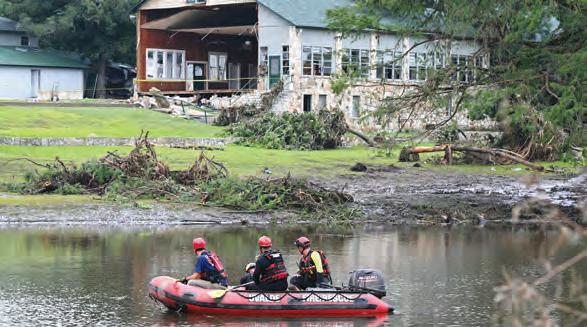
that CYJ remains safe and unaffected by the flooding, and will continue to monitor weather conditions closely as we prepare for the remainder of our summer sessions.”
While the Mystic tragedy affected Christian campers, at least one Jewish family lost everything in the Texas floods. Crissy Eliashar was home in Jonestown, Texas, about 30 minutes from Austin, with her three children and a friend who was sleeping over when the flood waters began surging into their home. They fled after a neighbor alerted them to the danger.
Now, other families at the Eliashars’ Jewish day school, Austin Jewish Academy, have been sharing an online fundraiser meant to help the family rebuild.
by the floods. May the memories of those lost be for a blessing,” Ramah Day Camp in Nyack, New York, wrote on Facebook.
“As part of the camp community, we understand the profound impact of summer camp, not just as a place of play, but as a nurturing environment that fosters growth, belonging, and joyful memories,” JCamps Baltimore, the Jewish Community Center of Greater Baltimore’s day camp organization, said in a statement. “We offer our deepest prayers for healing.”
Simon said in an interview that the crisis had left her “heartbroken” — and reflecting on the ties that cut across communities when it comes to summer camp.
“That’s why our hearts are broken alongside the camps in Texas who are grieving unimaginable loss after this week’s devastating flood,” Simon continued.
Amid a death toll nearing 100 across Texas, the tragedy at Camp Mystic stands out. The Christian camp, beloved locally, lost 27 children and counselors when the nearby Guadalupe River spilled over its banks early Friday morning. Three days later, 10 girls and a counselor were still missing. A photograph circulating on social media showed a bunk of smiling grade-school girls with their counselors — all of whom had been killed.
Two camp directors, Jane Ragsdale of Heart O’ the Hills and Dick Eastland of Camp Mystic, have also been confirmed to have died while trying to rescue the children in their charge.
The tragedy has resonated across the robust Jewish camping sector. In the United States, over 190,000 Jewish children attend Jewish camps annually. Jewish camps tend to run longer and draw children for more consecutive years than camps in other communities.
“I can’t stop thinking about this tragedy in
Continued from page 3
It’s a worthwhile endeavor, Hall noted.
“There’s not much you can do until you know your neighbor’s name,” she said.
“Real success is measured by whether you get together with someone different from yourself outside of this room. Did you get together for coffee? Did you take a walk? Did you have a meal together? A real conversation? Did you consider the questions that we have together in this setting outside of the room?”
The concerns for justice, Hall continued, are universal and shared across denomina tions, neighborhoods and cities.
“I work most with Episcopal and Lutheran churches; however, I interact with Methodists, Presbyterians, Roman Catholics, Orthodox, etc. It’s a wonderful diversity of people and the strands of concern regarding the justice needs of our neighborhoods and country are all around.”
Texas. I am sitting here desperately missing my girls, feeling the emptiness without them, but I have the gift of knowing that they are safe at camp,” Lizzy Savetsky, an Orthodox Jewish mother and social media influencer, posted on Instagram. “And I’m trying to wrap my head around the fact that not every mom gets that gift this summer.”
Jewish camps were quick to express their solidarity with those in Texas — while also reassuring anxious families that their own children were protected.
“Our hearts are broken for everyone impacted by the devastating floods in the Texas Hill Country. We are, especially, sending out thoughts and prayers to the entire camp community affected by the flooding here in Texas,” Camp Young Judea-Texas wrote on Facebook, in one representative post. “To the brave camp directors and staff who gave their lives protecting children, we honor you. Their heroism reflects the very best of our camp community.”
The Facebook post added, as more rainy weather was predicted, “We are grateful
“Last night we narrowly escaped the floods with our lives. My brave babies held on to each other and their beloved dogs while we waded out of our sliding house and into a raging river formed under and behind us,” Eliashar wrote on Facebook. “We need everything.”
Shalom Austin Jewish Family Services, a social services agency that like Austin Jewish Academy is housed on the Shalom Austin campus, announced it would offer free support sessions, emergency assistance and community processing spaces with licensed clinicians in the wake of the flooding.
“While our traditions and affiliations and identities may differ, we’re united by the belief that camp shapes lives in times of joy and in times of sorrow,” she said. “We obviously are heartbroken that the time of sorrow is now, and are sending our prayers and healing thoughts, and we want them to know they’re not alone, that across the country, Jewish camps and Jewish camp leaders are holding them in our thoughts and prayers.”
An Instagram post by a veteran of Jewish summer camp that went viral over the weekend echoed that point.
The course attempts to use a biblical perspective as mooring for those justice concerns, she explained.
If turnout is any indication, people are interested. More than 60 people have registered, split fairly evenly between members of the Jewish
“As Shabbat ends, our hearts are with all those impacted by the devastating floods in Central Texas, including the families of Kerr County and Camp Mystic,” the organization said in a statement on Saturday.
“This tragedy has touched so many lives, with members of our own Shalom Austin community among those affected. We offer our deepest thoughts and prayers for healing, comfort and strength to the families and communities facing loss and rebuilding.”
The crisis resonated far beyond Texas, as Jewish camps across the country sent condolences.
“Our hearts break for our extended camp family in Texas and for all those impacted

and Christian communities, which Fellman said shows the need for the class.
“We’re living in times when the national
“When you choose to send your child to sleepaway camp, you join a small, quiet, powerful club. It doesn’t matter the religion of the camp — Jewish, Christian, Muslim, Catholic — or the focus of the camp — sports, theater, nature, health,” wrote Sarah Cytryn, who travels from her home in Israel each year to send her children to Camp Ramah in Wisconsin, where her family has longstanding ties. “What unites us is a shared faith: in the power of camp, in the people who dedicate their summers to shaping young lives, and in our belief that this experience will help our kids grow, thrive, and discover who they are.”
To the families of Camp Mystic, Cytryn wrote, “You are not alone. We are all standing with you.” PJC
debate is being geared toward fear and distrust,” he said. “We try to assuage that and instead say, ‘Let’s get to know our neighbors and work together.’”
And while both he and Hall wish they lived in a world where this course wasn’t necessary, Fellman said both recognize the challenging times in which we’re living.
“I feel very fortunate to have a partner like Natalie,” he said. “Those kinds of partners are rare. We’re having fun. It’s been fun to wrestle with back and forth. We’re pretty open that sometimes we agree and sometimes we don’t. There are places of overlap and places where we’re widely different. But there’s a way to disagree as friends, and that goes against the current trend of how we operate.”
The course, Hall said, encourages people to learn what their neighbor thinks and believes, and also understand what they’re feeling.
“In my estimation,” she said, “that rarely results in breaking community. Instead, it results in building community with responsibility, with understanding, grace and a sense of friendship.” PJC
David Rullo can be reached at drullo@ pittsburghjewishchronicle.org.
Aparticular moment has stayed with me since I returned from my third trip with Classrooms Without Borders — a journey through the American South to learn about the Civil Rights Movement. That moment, and the trip as a whole, deepened my understanding of history, justice and my role as both an educator and a human being.

In Birmingham, we visited Temple Beth El and learned about the bombing that was attempted there in 1958. Sticks of dynamite were discovered outside a sanctuary window, placed by white supremacists who were targeting not just Black communities, but Jewish allies who dared to stand beside them in the fight for civil rights.
Our group had just come from the 16th Street Baptist Church, where four little girls were murdered in a bombing in 1963. At the church, there’s a memorial to those girls outside the window of the room where they lost their lives. To stand in that space and later walk into the synagogue — into a space filled with light, beauty and reverence — and know that the same kind of violence almost happened there, gave me a feeling I can only describe as dread, a heaviness that settled deep in my chest.
I felt a deep sadness at the church, especially standing in front of that window, imagining
those girls, their innocence and the hatred that stole their lives. But at the temple, that sadness took a different shape. It felt like anxiety, like a “what-if” that still echoes. The synagogue was a place of worship and community, and we were surrounded by stories of strength — including a Torah on display that survived
extermination camps and gas chambers. I’ve seen what hatred can do at its worst. But to visit the American South and hear how Jewish people, who had endured the Holocaust, continued to face discrimination in the U.S. while still choosing to fight for the rights of others, deepened my understanding of what
Jewish Americans, despite bearing their own traumas, stepped forward during the Civil Rights Movement, not out of obligation, but out of conviction. They recognized that justice is not selective — and neither is courage.
the Holocaust. That moment hit me. Survival isn’t something that only happened in the past. Jewish communities have had to survive again and again — across borders, across generations. From Europe to the American South, the same resilience can be felt in these sacred spaces. The Torah that survived Nazi destruction now sits in a synagogue that withstood an attempted bombing less than two decades later.
That connection between past and present made it impossible to ignore how close we still are to hatred and how urgently we must protect what’s sacred: our communities, our neighbors and our shared humanity.
On previous Classrooms Without Borders trips, I stood inside concentration camps,
resiliency truly means.
On this trip, we also stepped inside a recreated train car — the kind that once transported enslaved people across the U.S. as they were sold and relocated. They were treated not as people, but as property. We stood inside a preserved cabin once inhabited by those enslaved at a forced labor camp. The air was thick, the space stifling and the conditions a heartbreaking reflection of how inhumanely people were forced to live. It was a painful, physical reminder of how deep the roots of injustice run in this country.
I’ve visited historical sites in Europe; I remember the clarity I felt there. In those places, it was easy to demand accountability,
Want to understand what’s wrong with the
movement? This Palestinian can help.

When Ahmed Fouad Alkhatib arrived at my house for a recent Shabbat dinner, he looked terrible.
“I think the film shoot upset my stomach,” he said.
That was in late May. The result of that film shoot, a nearly two-hour video, dropped on YouTube in June, and has racked up more than 1 million views. In it, Alkhatib, who was born in Gaza and has written op-eds for the Forward, sits surrounded by 20 self-described pro-Palestinian activists, and one by one debates with them over Gaza, Israel, Zionism

Justbefore I stepped into a guest lecture for a master’s class on innovation and entrepreneurship at the College of Management Academic Studies in Rishon LeZion, I made a short but unforgettable detour. A visit to the college’s food bank and coordination center for
and the Palestinian future. It’s for a series called “Surrounded.”
Watch it, if you have a stronger stomach than Alkhatib, and try to figure out how the
support for Palestinians.
In the video, Alkhatib sits at a small table, his debate opponents positioned in a circle around him, and rushing into the empty seat across
It’s depressing, sure, to see what sometimes feels like an entire generation embrace violence and commit to a dead-end narrative — theoretically in the name of human rights.
pro-Palestine movement got to a place where 19 people who have never set foot in Gaza — most of whom aren’t even Palestinian, Arab or Muslim — can smugly lecture a man who has to date lost 35 family members to Israeli bombs about the supposed insufficiency of his
Oct. 7 victims. It was a modest room, stacked with donated supplies, yet it pulsed with love, loss, quiet determination and the unmistakable power of compassion
Ten students from the college were murdered in the Oct. 7 massacre. Two others had loved ones taken hostage. And yet, out of that devastation, this space had become a sanctuary of service. Shelves of food and clothing lined the walls, each box carefully marked for army units, for grieving families, for displaced civilians. Some held handwritten notes of hope tucked between tins of tuna and packages of pasta. I
to say, “This was wrong, and someone should have answered for it.” But standing inside that train car in the U.S., I realized there’s a hesitation when the injustice is ours, when it’s woven into our soil. It’s harder to ask, “Who will be held responsible?” when we’re talking about ourselves.
There’s a lie we’ve told ourselves: that America couldn’t possibly be capable of something so cruel. But in that moment, the parallels between the horrors of Nazi Germany and the systemic dehumanization of Black people in the United States became impossible to ignore. The structures may have looked different, but the violence, the silence, the erasure — they mirrored each other in haunting ways.
As I return to my classroom, I carry with me the weight of these stories and the strength of those who chose to stand up, even when it was dangerous, even when it wasn’t their fight alone.
Jewish Americans, despite bearing their own traumas, stepped forward during the Civil Rights Movement, not out of obligation, but out of conviction. They recognized that justice is not selective — and neither is courage.
That kind of moral clarity, rooted in lived experience and unwavering empathy, is what I hope to pass on to my students. It’s not enough to teach history; we must teach responsibility. My goal is to help them see that their voice matters, that silence is complicity and that choosing to stand up for others is how we build a more just world — together. PJC
Kristina Rhoades is a 12th grade English teacher at South Allegheny High School.
from him whenever they have a point to make.
First in the chair was a Latino-looking man who pointedly and without explanation refused to shake Alkhatib’s hand.
Alkhatib asserted that Hamas was responsible for launching the brutal attack of Oct.
was moved. Deeply. Humbled beyond words. This is the Israel the world does not always see. The Israel that, in its most broken moments, becomes its most beautiful. Here, resilience is not just a national slogan, it is a lived tradition. Renewal is not merely recovery; it is a reinvention, powered by an irrepressible will to help. Israelis do not wait for permission to care. They act. They show up. They bring soup and strollers, shade and shelter to the frontlines and to the brokenhearted.
Since Oct. 7, and again during the recent war with Iran, Israeli civil society has become
7, 2023, dooming Gazans to the hell that Israel has wrought.
“So by that logic,” the man answered, “if Zionists wouldn’t have colonized Palestine, then none of this would have begun to begin with, right?”
Alkhatib said that Gaza had the resources to be a jewel, but Hamas led it down a path of destruction. The man rolled his eyes.
“It’s a very simple question,” the man asked. “Who put your parents in a refugee camp?”
Goading a violent Israeli response and achieving maximum Palestinian casualties was Hamas’ strategy all along, countered Alkhatib — who sought political asylum in the U.S. after Hamas seized total power in Gaza in 2007. “My point is I don’t want what remains of my family to merely become a social media phenomenon.”
something astonishing, an “emergency response empire,” built not by decree but by neighbors. By mothers and teachers and teenagers and retirees. By people who, despite everything, choose kindness.
Take, for example: In the wake of Iran’s missile barrage, 40,000 volunteers sprang into action. Forty thousand. They organized childcare for doctors on night shifts, built pop-up f ield kitchens, delivered resilience kits to frightened children, coordinated psychological
Last week, the Chronicle asked its readers in an online poll the following question:
“How do you primarily stay informed about news related to Israel and the Jewish world?” Of the 255 people who responded, 41% said national or Israeli Jewish news media; 28% said the Pittsburgh Jewish Chronicle; 25% said mainstream (non-Jewish) news media; 5% said social media and friends; and 1% said community events. Comments were submitted by 66 people. A few follow.
I subscribe to Haaretz, read mainstream publications, watch network news and read the Chronicle.
Wall Street Journal, Times of Israel, other Israeli new media and also the Pittsburgh Jewish Chronicle. I especially like the curated pieces in the Chronicle.
It’s a combination of sources. News often hits social media before mainstream media picks it up. However, I also follow Israeli news media, the Chronicle and mainstream news media on social networks, so I source quite a bit of information from there.
i24 News is the most updated and nonpolitical news in my opinion.
Eshman:
Continued from page 12
Watching to the end of the video, I saw a few canned, expected rhetorical patterns repeat: Israel is guilty of the original sin of imperialist colonization. All evil flows from that, and therefore Zionists get what they deserve. Violence, murder, killing — or, as Alkhatib’s interrogators call it, “the resistance” — is entirely legitimate because, well, see the first point.
Finally, the past matters more than the present or future. The latter item is, astonishingly, only mentioned four times, all by Alkhatib.
Ogunleye:
Continued from page 12
support, and distributed food and essentials to tens of thousands. Nearly 214,000 people were directly helped, and countless more felt the ripple effects of their care.
One such volunteer is Orly Schwarz from Petah Tikva. A communications professional and mother, she transformed her home into a logistics command center. From her phone and laptop, and powered by sheer will, she orchestrated a civilian supply chain that fed thousands of soldiers each day. Five thousand meals daily. Plus mattresses. Plus field showers. Plus barbecues to boost morale. “Everything but the tanks,” she quipped.
Orly’s effort is just one of more than a thousand civic initiatives documented by Hebrew University and the Social Welfare Ministry. Seventy-eight percent of these sprang up since Oct. 7. And most were launched by ordinary individuals. No funding. No bureaucracy. Just heart.
When Iran fired more than 550 missiles into Israeli cities, these volunteers were ready, again. Ready with transport, with shelter, with love. What I saw at that college food bank was echoed all across the country. A quiet uprising of goodness. A refusal to give in to despair. There is a reason Israel continues to astonish. It’s not just its military brilliance or tech innovation. It is moral imagination, the kind that
How do you primarily stay informed about news related to Israel and the Jewish world?
I read it all: CNN, Fox News, New York Times, New York Post, Times of Israel, Jerusalem Post. All the news has so much bias, one really needs to look at it all from all angles to see what is going on.
A man named William, the only other native Gazan in the circle, said there can never be peace because Ashkenazi Jews came and forced his grandparents and others from their homes.
“I’m a radical pragmatist,” Alkhatib told him, after correcting William’s assertion that most Jewish Israelis are Ashkenazi — the majority are Sephardic or Mizrahi. “I am forward-looking and thinking about the future, though I acknowledge that there have been historic injustices.”
When Alkhatib, who runs the Realign for Palestine initiative at the Atlantic Council, showed up at my house for a quiet Shabbat dinner after the grueling filming experience, he said it had taken up most of the day. He was beat, and perplexed.
stares catastrophe in the face and responds not with rage, but with resolve. With food boxes. With WhatsApp groups. With hope.
A recent study found that nearly half of all Israeli citizens volunteered in the first two weeks after Oct. 7. And 28% of them had never volunteered before. That is the alchemy of shared grief transformed into shared strength.
Volunteers crossed every boundary — secular and religious, young and old, Arab and Jew. Tech executives and bakers. Teachers and taxi drivers. One people, one purpose: How can I help?
That question echoes in every act of kindness. In every care package. In every soldier’s smile. In every child’s comforted tears.
And yes, while government response can be slow, the people lead. They do not wait for permission to heal. They build bridges in the rubble. They design solidarity in real time.
Let us not overlook what is happening here. Civil society in Israel is not playing a supporting role, it is headlining the story of national renewal. From grassroots WhatsApp networks to nationwide nonprofits, Israelis are building something extraordinary: a culture of showing up. An ecosystem of empathy. A network of hope.
We often call Israel the “startup nation.” But maybe the greatest startup of all is its courage. Its willingness to prototype empathy. To beta-test a better world, one package, one
I look at Israeli news sources from across the political spectrum. The Chronicle is also a good source for big ticket news items, especially the daily email newsletter.
I try to depend not only on the news but also on relationships I have and can nurture with friends on the ground in Israel and the West Bank. I read perspectives that may make me uncomfortable or that I may disagree with so I don’t stay in my protective bubble and get stuck in thinking that serves to reinforce my narrative only. That will never be productive or forward-thinking.
Social media from reputable Jewish organizations is a great resource.
For the latest and more factually accurate information we use a combination of the Pittsburgh Jewish Chronicle, national and Israeli media, and social media. It is definitely not legacy mainstream media. However we read the mainstream media to keep a pulse on how anti-Israel and anti-Jewish the reporting is since it reflects general attitudes.
I read some articles in the Pittsburgh Jewish Chronicle, but your paper leans
“I have more right than anybody to be angry,” Alkhatib said at dinner. “But violence leads to more violence. It doesn’t work. It just goes round and round and everybody dies.”
Our dinner guests included two young Jewish adults, the same age as most of the people in the video. During dessert they each asked Alkhatib a version of the same question: How can they stand up for coexistence, when their friends are 100% anti-Israel?
“For them it’s a zero-sum game,” said one of the guests, a 20-something musician who was at Coachella when the band Kneecap cheered, “Up Hamas! Up Hezbollah!”
It’s depressing, sure, to see what sometimes feels like an entire generation embrace
prayer, one person at a time.
What I saw in that small food bank was more than relief, it was love in motion.
This is not just a nation enduring.
This is a nation innovating the future with grit, grace, and great big hearts.
heavily to the left politically. I wish you were more in the center.
I prefer to read the Israel press and Saudi press for information. They give a much better view of what’s happening. They are two to three days ahead of all U.S. media. There is much more information available through these sites.
Combination of Pittsburgh Jewish Chronicle for Jewish perspective, and mainstream (non-Jewish) news media for Israeli and Jewish events on the world and national stage.
I use many sources, including national and Israeli Jewish news media on Facebook. I consider the Pittsburgh Jewish Chronicle, the Los Angeles Jewish Journal and the Jewish Insider to be important and share some of the stories with friends. PJC
— Compiled by Toby
Tabachnick
Chronicle weekly poll question: Do you think Donald Trump should be awarded a Nobel Peace Prize? Go to pittsburghjewishchronicle.org to respond. PJC
violence and commit to a dead-end narrative — theoretically in the name of human rights.
But by showing us how that process is unfolding, Jubilee, the company behind the video, is also performing a public service. Years from now, when historians try to answer how the pro-Palestinian movement managed to achieve so little, despite such widespread support, they can watch “Surrounded,” and see why. PJC
Rob Eshman is a senior columnist for the Forward, where this first appeared. To get the Forward’s free email newsletters delivered to your inbox, go to forward.com/ newsletter-signup.
James Ogunleye, PhD, is the convener of the upcoming “Resilience & Renewal: Innovating the Future of Israel” project. This first appeared on The Times of Israel.
When it comes to hate, citizenship has its privileges
Regarding “State Dept. revokes visas for Bob Vylan following ‘death to the IDF’ chants at Glastonbury” (July 4):
What these musicians did was clearly despicable, but the story does not end there. In announcing the visa revocation, Department of State spokesperson Tammy Bruce said, “Foreigners who glorify violence and hatred are not welcome visitors in our country.” It is a good thing for Donald Trump that a president who glorifies and incites violence, and who provokes hatred, is not in a position to have his citizenship revoked.
Oren Spiegler Peters Township
We invite you to submit letters for publication. Letters must include name, address and daytime phone number; addresses and phone numbers will not be published. Letters may not exceed 500 words and may be edited for length and clarity; they cannot be returned. Send letters to: letters@pittsburghjewishchronicle.org or Pittsburgh Jewish Chronicle, 5915 Beacon St., 5th Floor, Pittsburgh, PA 15217
We regret that owing to the volume of correspondence, we cannot reply to every letter.
By Jonathan D. Salant | JNS
It was the year Israel shocked the world. The baseball world, that is.
Team Israel entered the 2017 World Baseball Classic ranked No. 41. It won a qualifying round to become the 16th and final team in the tournament. It upset South Korea (No. 3), Chinese Taipei (No. 4) and the Netherlands (No. 9) to advance to the second round.
Then the team, out of nowhere beat Cuba (No. 5) in the second round before the clock struck midnight, and it lost its final two contests. The team was the subject of the 2018 documentary, “Heading Home.”
“We really put ourselves on stage,” team trainer Barry Weinberg, who has eight World Series rings as a trainer for three Major League baseball teams, told JNS.
“I got back to West Palm Beach and I’m sitting at the curb waiting for my ride, and I had my Israel baseball duffle bag,” he said. “A guy comes up and says, ‘Hey, were you part of that team?’ I said, ‘Yeah.’ He says, ‘Man, you should be proud.’”
Almost a decade later, Israel Baseball is still basking in the glow of its upset run, as it seeks to take the next step in making baseball





Americas, sprang from that 2017 magical run through the World Baseball Classic and is looking at American Jewry as a source of funding, volunteers and players to help grow baseball in Israel.
“It elevated the interest in the United States a hundredfold,” Shlomo Lipetz, a member of Team Israel for 34 years and a pitcher on that 2017 squad, told JNS.
“The organization is getting hundreds of emails a week saying, ‘How can I donate my time?’ ‘How can I donate the money?’ ‘How


“Only those who do nothing at all make no mistakes.”







“That connection is undeniable, and I think it plays to our advantage,” Lipetz said.
‘Why not connect it?’
For Jews of a certain age, the seminal moment of their lives was Los Angeles Dodgers pitcher Sandy Koufax refusing to pitch on Yom Kippur during the 1965 World Series.
“We’ve had almost 200 MLB players, and there have always been Jews in baseball, so why not connect it?” Wesley Seidner of Fairfax, Virginia, said.
At age 16, Seidner wrote a book on Jewish ballplayers, “K for Kosher.” (“K” is a notation for a strikeout in baseball scorekeeping.)
“There’s a sense of pride in that we’re 0.2% of the world’s population yet nearly 1% of all MLB players are Jewish,” Seidner said.
Seidner was one of the fans who attended Jewish Heritage Night last month with the Bethesda Big Train, a wood-bat summer collegiate baseball team that plays in the Maryland suburbs of Washington, D.C.
Weinberg and Lipetz threw out the first balls before the game and were interviewed between innings by Bruce Adams, founder and president of the Big Train.
Ties between the team and the local Jewish community run deep. The Big Train played an exhibition game against the Israeli national team as a tune-up for the 2021 Olympics.
“People now know who we are,” Weinberg said. “We’re not just the Bad News Bears and the Jamaican bobsled team.”
Israel Baseball Americas is run by two veterans of the 2017 squad: CEO Nate Fish, who manages the Israel national team, and Adam Gladstone, chief operating officer, who was director of operations for Team Israel.
Both men were part of the 2012 and 2023 World Baseball Classic teams and the 2021 Tokyo Olympic squad.
‘Baseball is America’s pastime’
“We felt that in order to support baseball in Israel, we needed to concentrate on baseball players and fans and supporters here in the United States,” Gladstone said.
“Our focus is helping to grow the game of baseball in Israel.”
The group is registered as a charitable organization, which means it can accept
tax-deductible contributions. That and merchandise sales are what it hopes will support Israel’s baseball squads in the Olympics, the World Baseball Classic and other tournaments.
The money is also earmarked for camps and clinics, ballfields and building a professional organization like those in the major leagues, with scouting and development.
Amid war in Israel and rising antisemitism in the United States, Gladstone said that there is eagerness to support the Jewish state.
This is one way to do so.
“With what has transpired since Oct. 7, there are many people who want to support Israel in many different ways,” Gladstone said. “There are a ton of people in the United States looking for things to support with the name Israel. Baseball is America’s pastime.”
“This is the best location to try to generate the donations and the interest in what we’re doing,” he said.
The 2017 run remains on everyone’s minds, he said.
“Everybody talks about it and they say it with pride and they feel a part of it,” Gladstone said. “We were representing something much larger than our team. With everything that Israel is associated with today, this gives people a non-political entity with the name Israel on it.”
“This is about providing opportunities for players to wear Israel across their chest all over the world,” he said.
‘We now have role models’
Lipetz has marveled at improved talent on Israel’s rosters, and Israel Baseball Americas is one of the tools to keep that pipeline flowing, he thinks.
At 46, one of his main contributions is to serve as a role model for those up-andcoming players, he told JNS.
“When I grew up in Israel, there was no baseball on TV,” he said. “There were no baseball cards. I did not have any role models. Every player in Israel who is playing baseball knows of me” and of Ryan Lavarnway, the former major league catcher who was the most valuable player in the first round of the 2017 World Baseball Classic, Lipetz said.
“We now have role models I couldn’t even imagine having when I started playing 35 years ago,” he said.
Israel didn’t enjoy the success in the 2023 World Baseball Classic that it had in 2017, but it did well enough to automatically qualify for next year’s tournament. This time, Israel will enter ranked No. 19.
Lipetz said there was hope that more Jewish major leaguers would sign up to play on Team Israel in 2026, where they would be surrounded by fellow Jews rather than being the only “chosen” player on their teams.
“The biggest leap as a team that we’ve made is, it used to be, ‘Oh, we’re happy to be here,’” Lipetz said. “Now it’s, ‘We’re truly disappointed if we don’t make it to the next round.’”
“We belong here and we can beat any given team any given day,” he said. “That’s now truly rooted in Team Israel.” PJC
Stanley Marks, MD Chairman, UPMC Hillman Cancer Center






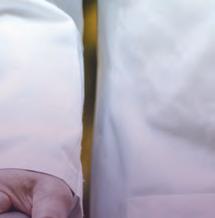














By Yafa Negrete | Special to the Chronicle
My Syrian great-grandmother, Leah Seur, arrived in Mexico in the early 1900s with her husband, Isaac Mizrahi, and three of their children. My grandmother Esther, one of 12 siblings, was born in Mexico. On their long journey by ship to the Americas, Leah brought with her a set of pots — specifically for making rice. Maybe she feared that without her familiar utensils, she wouldn’t be able to make rice in Mexico as well as she had in Damascus.
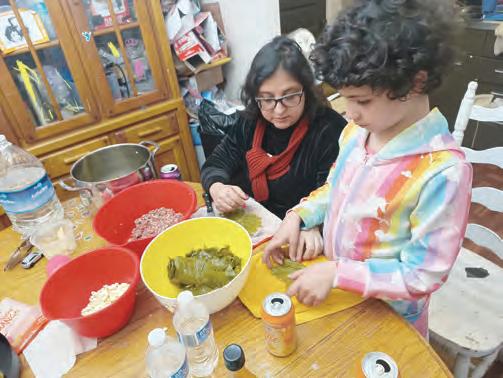
Ever since I can remember, I’ve made this dish for Rosh Hashanah and Pesach. Yes, even though our family name is Schnadower, my husband’s and mother’s families are from Syria and rice has always been a staple on our holiday table.
My Syrian grandmother, Esther, and my mother didn’t have the patience to teach me how to make more complex dishes, like kibbeh, but this one was simple enough to learn on my own. Rolling the “taquitos ” usually takes about two hours, followed by another hour of cooking. It’s the perfect time to share holiday memories, go over final preparations for the meal, and fill the house with the unmistakable smells of the season. Now, I’m teaching my daughter Liora how to make them. Sometimes my husband and son join in, but she’s the most enthusiastic.
Every holiday, I see how much she’s improving — it’s a beautiful way to watch her fine motor skills develop. Last time, she rolled the grape leaves so carefully there were almost no holes!
There are many variations — some served cold, some made with just rice or with lamb — but our favorite (and the only one I know how to make) is the version with ground meat and rice in lemony broth.
For the grape leaves:
1 (32-ounce) jar brined grape leaves
1 cup uncooked long-grain white rice
2.2 pounds ground meat
¼ cup fresh mint leaves, finely chopped (or 1½ tsp dried mint)
1 tablespoon garlic powder
½ teaspoon salt (or to taste)
¼ teaspoon black pepper (or to taste)
For the broth:
Juice of 3 large lemons
¼ cup fresh mint leaves, finely chopped (or 1½ tsp dried mint)
2 garlic cloves, chopped
½ teaspoon salt (or to taste)
¼ teaspoon black pepper (or to taste)
Instructions
1. Prepare the leaves:
Drain the grape leaves and carefully remove them from the jar to avoid tearing.
2. Make the filling:
In a large mixing bowl, combine the rice, ground meat, mint, garlic powder, salt and pepper. Mix gently until well combined.
3. Prepare the pot:
In a wide 6- to 7-quart pot or deep skillet, add about 1 tablespoon of olive oil and swirl or brush it around to coat the bottom.
4. Stuff and roll the leaves:
Work with one leaf at a time. Lay it flat on your work surface, shiny side down, vein side up.
Trim any remaining stem at the base.
Place about 1 tablespoon of filling near the base of the leaf. Shape it into a compact line, about 2–3 inches long depending on leaf size. Fold the bottom of the leaf over the filling, then fold in the sides, and roll tightly from
bottom to top into a cigar shape.
5. Layer in the pot:
Place each rolled grape leaf seam-side down in the pot. Pack them snugly to prevent unrolling during cooking. Add a second layer on top in the opposite direction, if needed.
6. Prepare the broth:
In a bowl, mix the lemon juice with the chopped mint, garlic, salt and pepper. Set aside.
7. Cook the grape leaves:
Add enough water to the pot to just cover the grape leaves.
Cover with a tight-fitting lid and bring to a boil over medium-high heat.
Reduce heat to low and simmer for 1 to 1½ hours, until the leaves are tender and the filling is fully cooked.
Check occasionally and add more water if needed to keep them covered.
8. Add the broth:
Once the meat and rice are cooked through, pour the lemon-mint broth over the grape leaves. Simmer for a few more minutes.
9. Serve:
Serve warm, with some of the broth spooned over the top. PJC
Do you have a tried-and-true dish that comes with an interesting origin story? If so, we want to hear from you! Submit recipes along with their backstories to newsdesk@pittsburghjewishchronicle.org, and write “Recipe” in the subject line. Please include a photo of the dish. Your recipe may be our next Savoring Story!

By David Wiseman | JNS
The 2028 Los Angeles Olympic Games will feature several sports that appeal to American audiences, including baseball, softball, lacrosse and flag football.
With a thriving American football scene in the Holy Land, the Israeli National Flag Football Teams — men and women — are doing everything they can to qualify for the Olympics. It won’t be easy. With the United States receiving an automatic spot as hosts, only five qualifying spots are available for the rest of the world in each of the six-team tournaments.
For Steve Leibowitz, president of American Football in Israel, qualifying for the Olympics would be the crowning achievement of his more than four decades of dedication to the sport and the country he deeply loves.
In 1988, Leibowitz co-founded the American Touch Football in Israel league. The ATFI later evolved into a flag football league, now known as the AFI. From its humble beginnings, Leibowitz and his dedicated team have transformed the sport in Israel into a professionally organized program, with thousands of players from across the country, alongside trained coaches and referees.
As the sport continues to grow, AFI is set to reopen the original Kraft Family Stadium in Jerusalem, where there is already another field.

to flag football,” Leibowitz told JNS. “We are also planning to build a facility in Haifa, which would give us three outstanding venues.”
But nothing boosts a sport’s profile like playing on the world’s biggest stage. “Qualifying for the Olympics would be incredible exposure for the sport in Israel. It would provide a huge boost and our players — now Olympians — could promote the sport in ways only that status allows,” Leibowitz explained.
The road to Los Angeles officially begins in Paris, where the 2025 European Championships will take place in late September. That tournament serves as a qualifier for the World Championships, which, in turn, determines Olympic qualification. The better the team performs in the Euros, the better its chances at Worlds — and ultimately, at making it to Los Angeles.
Leibowitz and his team are leaving no stone unturned as they prepare for the European
we were unable to attend due to widespread flight cancellations. We’re now exploring alternative preparations for the September tournament,” he said.
Men’s team confident of going far
The men’s team is already close to the top, having finished ninth at the last World Championships in Finland and third at the most recent European Championships in Ireland. Head coach Jonathan Tekac, who made aliyah from Pennsylvania and played college football for the Youngstown State Penguins, is quietly confident in their chances.
“We’re currently ranked eighth in the world, so the margins between us and the top six are very narrow. It all comes down to performance on the day,” Tekac told JNS. “We have the potential to achieve something great, and that’s what’s most exciting.”
Current conditions have affected the team’s preparations, with around 60% of players serving in the Israel Defense Forces, one of the highest percentages among Israeli national teams.
Still, Tekac is pushing forward. “The players have been working hard on strength, conditioning and tactical preparation,” he said. “We’re eading into the European Championships with confidence. We’re doing everything we can not only to compete, but to win.”
Despite the less-than-ideal lead-up to the competition, especially the war against Hamas and Iran, the team refuses to make excuses. Players are studying film, learning the playbook and preparing as best they can.
On the women’s side, coach Elyssa Sagoskin is equally enthusiastic about her team’s potential. Sagoskin, a former player, was part of the Israeli squad that won two bronze medals and one silver at European Championships between 2009 and 2012, and another silver in 2017.
“I played on some of those teams and started coaching during that era. This team has a real chance to do something special,” she said. “The level of competition is higher now than it was even in 2017, so the challenge is greater.”
“Athletically, we’re more talented than any of the previous teams, and we have an incredible work ethic. What I love is how this team
Please see Football, page 22
This is one in a series of articles about Elder Law by Michael H. Marks., Esq.
Michael H. Marks is an elder law attorney with offices in Squirrel Hill and Allison Park. Send questions to mhm@a-h.law or visit www.a-h.law.
After you create and sign a Powers of Attorney, a Will, a Trust etc. where should the originals go?
The factors involved in the decision are usually security, access and access for others on your behalf. Here are the most common choices, with the pros and cons for each.
AT HOME IN A SAFE OR FIREBOX:
• Pros - easiest accessibility, including for others to whom you give access.
• Con - less secure versus fire or water or even theft. Also, without your information, password or key, your successors may not have easy access at all.
IN A BANK SAFE DEPOSIT BOX:
•Pros – most secure versus damage or loss.
• Cons - worst access, specifically, only during bank hours, and with paperwork, including for successors after your death. Also costs something for box rent.
WITH YOUR ATTORNEY:
• Pros - generally more secure not less. Attorneys have a professional, ethical obligation to safeguard your documents. Better emergency access than at a bank.
• Con - you can lose contact with one another, e.g. if either of you moves retires, etc. Your successors may not as easily
locate your documents. Also, the modern trend for attorneys is to not assume this responsibility.
WITH ANOTHER INDIVIDUAL:
•No. Make your own secure arrangements.
Additional notes:
• First, in Pennsylvania there is no provision for filing your Will with the court in advance during your lifetime (and if you did, then you’d also have to file any updates). You can file or record Powers of Attorney, but It’s usually only done when necessary for a transaction.
• Second, if an original Will is lost, it’s possible but can be very difficult to probate a copy of the Will.
My recommendation? None of these alternative leaps out as far away the best or the worst. It’s a matter of personal preference.
Second question: When will you need the originals, and not just copies? It varies for each document.
For a Healthcare Power of Attorney and Living Will, the answer is, almost never. It’s a great irony to me that the rules are so strict when money is involved, but not for mere life and death.
For a Financial Power of Attorney, the answer is rarely. For example, if your Agent under POA is selling your home for you, after you’ve already moved. Usually a copy will suffice.
Finally, for a Last Will and Testament, the original Will must always be available, BUT only if if it must be probated. Not every estate needs to go through probate.
Next, I’m writing with exciting news and heartfelt appreciation.
Beginning June 1, 2025, I have joined the law firm of Abernethy and Hagerman, LLC, in Allison Park on Rt. 8.
This change reflects a shared commitment to compassionate and effective elder law services. I believe this move will benefit you and your loved ones. Thank you for entrusting your legal work to me now, in the past and in the future. I appreciate the opportunity to assist you.
My new firm does the same kind of work that I do now. Attorney Jay Hagerman and his team at Abernathy & Hagerman are friendly and extremely accomplished (Abernathy is retired.) This move will assure continuity and greater service to my clients.
The new office is on Rt 8 in Allison Park, about a 25 minute drive from the present office. I’ll be there daily, BUT the Murray

Avenue office will stay open part time, by appointment, through September 30th, to help transition nearby clients. And as always, I’ll also still gladly make house calls and come to see you when needed. You will still be able to reach me at the same phone number, 412-421-8944 and email address, michael@marks-law.com, OR at the new firm phone number, 412-486-6624 or email address mhm@a-hlaw.com.
Abernethy and Hagerman is a trusted elder law firm that I’ve long admired, and Jay shares my approach to client service. While I’ll continue managing open cases personally, the team and resources at Abernethy Hagerman will allow us to better serve you and future clients.
We’ve helped a LOT of people, and I’m grateful to each of you. Let me know how I can help you going forward in any way. This is just the start of a new chapter. Thank you for your continued trust.














a sacred moment. The beauty of the camp was not just in the landscape, but in the holy community it nurtured.




It’s easy to find beauty in the natural world. A colorful sunset, an ancient tree or even the vast expanse of a desert can inspire awe. In contrast, human-made structures are often designed for function, not for wonder. So why is it that in this week’s Torah portion, the blessing we receive is not over a natural marvel, but over something built by human hands?
What Balaam waw in the camps of Israel and what we can see today
Rabbi Emily Meyer
Parshat Balak
Numbers 22:2 – 25:9
Parshat Balak tells the story of a hired prophet, Balaam, summoned to curse the people of Israel. With the help of both God and an unlikely guide — a talking donkey — Balaam’s mission is thwarted, and instead, he offers words of blessing. He first speaks to the size and strength of the people and of their distinctive relationship with God. In his final declaration, he offers the words:
Rashi, the great medieval commentator, adds a meaningful layer to Balaam’s blessing. He explains that Balaam noticed how the tents were arranged — none of the entrances faced each other. This intentional layout reflected a deep value: modesty and respect for one another’s privacy. The blessing, then, wasn’t merely about architecture, it was about ethics. These tents, these dwellings, embodied the spiritual values of the people who lived in them.
It’s easy to find beauty in the natural world. A colorful sunset, an ancient tree or even the vast expanse of a desert can inspire awe. In contrast, human-made structures are often designed for function, not for wonder. So why is it that in this week’s Torah portion, the blessing we receive is not over a natural marvel, but over something built by human hands?
Parshat Balak tells the story of a hired prophet, Balaam, summoned to curse the people of Israel. With the help of both God and an unlikely guide a talking donkey Balaam’s mission is thwarted, and instead, he oQers words of blessing. He first speaks to the size and strength of the people and of their distinctive relationship with God. In his final declaration, he oQers the words:
“How
, How goodly are your tents, O Jacob, your dwellings, O Israel! This blessing has become a cornerstone of Jewish liturgy, recited each morning as part of our prayers.
That same spirit carries into our tradition today. There is a custom to recite Balaam’s blessing when approaching a synagogue. As we near the building, we take a moment to physically and spiritually prepare — straightening our clothes, dusting ourselves off, readying ourselves to enter a sacred space. While doing so, we might recite the words of this blessing to connect our preparatory actions with our holy purpose. The synagogue, like the tents of Israel, becomes more than a building; it becomes a space that calls us to live our values with intention.




goodly are your tents, O Jacob, your dwellings, O Israel!” This blessing has become a cornerstone of Jewish liturgy, recited each morning as part of our prayers.



SPECIAL OCCASIONS DESERVE SPECIAL ATTENTION


What is a special occasion…a birth, a b’nai mitzvah, an engagement, a wedding, an anniversary? Absolutely!
But so is a birthday, a graduation, an athletic victory, an academic achievement…anything that deserves special recognition.
During my years working at Jewish summer camp, my favorite job was monitoring the climbing tower. Campers would challenge themselves, summoning courage and strength to scale its 50-foot height. When they reached the top, we’d ask them to pause, look out over the camp and recite those ancient words: Mah tovu ohalecha Yaakov. They gazed out at the tents and cabins below and the physical spaces that housed the fun, friendship and even learning that happened at camp. Reciting those words transformed seeing this view into
During my years working at Jewish summer camp, my favorite job was monitoring the climbing tower. Campers would challenge themselves, summoning courage and strength to scale its 50-foot height. When they reached the top, we’d ask them to pause, look out over the camp and recite those ancient words: Mah tovu ohalecha Yaakov. They gazed out at the tents and cabins below and the physical spaces that housed the fun, friendship and even learning that happened at camp. Reciting those words transformed seeing this view into a sacred moment. The beauty of the camp was not just in the landscape, but in the holy community it nurtured.
Our built environments — synagogues, camps, homes, community centers — are more than structures. They are sacred because of what they contain: the relationships we build within them, the values we uphold and the communities we create. Just as Balaam recognized the beauty in the tents of Israel, may we too recognize the holiness in the spaces we shape and the lives we build together. PJC

And there is no better place to share your joy than in...
a wedding, an anniversary? Absolutely! achievement…anything that deserves special recognition.
And there is no better place to share your joy than in...
And there is no better place to share your joy than in...

And there is no better place to share your joy



The more you celebrate in life… the more there is in life to celebrate!
The more you celebrate in life… the more there is in life to celebrate!
The more you celebrate in life… the more there is in life to celebrate!
SEND YOUR CELEBRATIONS, MAZEL TOVS, AND PHOTOS TO: announcements@pittsburghjewishchronicle.org
The more you celebrate in life… the more there is in life to celebrate!
SEND YOUR CELEBRATIONS, MAZEL TOVS, AND PHOTOS TO: announcements@pittsburghjewishchronicle.org
SEND YOUR CELEBRATIONS, MAZEL TOVS, AND PHOTOS TO: announcements@pittsburghjewishchronicle.org
SEND YOUR CELEBRATIONS, MAZEL TOVS, AND PHOTOS TO: announcements@pittsburghjewishchronicle.org
Rashi, the great medieval commentator, adds a meaningful layer to Balaam’s blessing. He explains that Balaam noticed how the tents were arranged none of the entrances faced each other. This intentional layout reflected a deep value: modesty and respect for one another’s privacy. The blessing, then, wasn’t merely about architecture, it was about ethics. These tents, these dwellings, embodied the spiritual values of the people who lived in them.
Rabbi Emily Meyer is an educator and the founder of Doodly Jew. This column is a service of the Greater Pittsburgh Jewish Clergy Association.
That same spirit carries into our tradition today. There is a custom to recite Balaam’s

In the Court of Common Pleas of Allegheny County, PA: No. GD 25 - 5055 In Re: Petition of Nancy Maureen Niemczyk for change of name to Nancy Anderson Niemczyk. To all persons interested: Notice is hereby given that an Order of said Court authorized the filing of said Petition and fixed the 30th day of July, 2025, at 9:30 a.m. as the time and the Motions Room, City-County Building, Pittsburgh, PA, as the place for the hearing, when and where all persons may show cause, if they have any, why said name should not be changed as prayed for. Thomas Pandaleon Esq., 684 Thomas Blvd., Pittsburgh, PA. 15208 TomPgh@aol.com
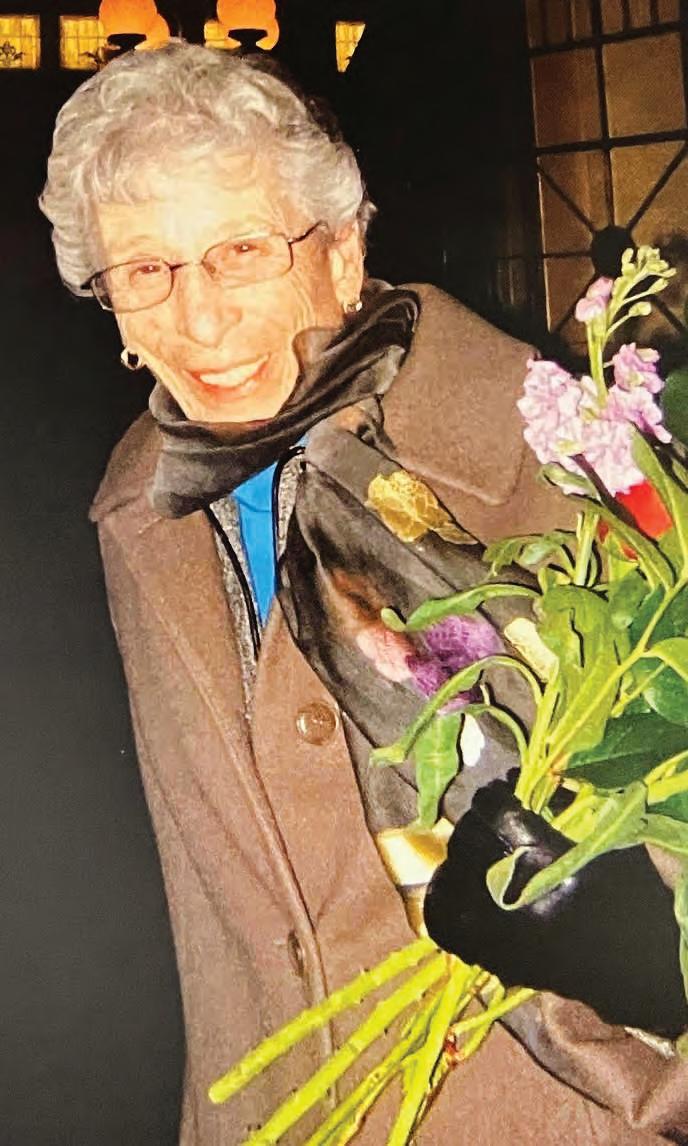
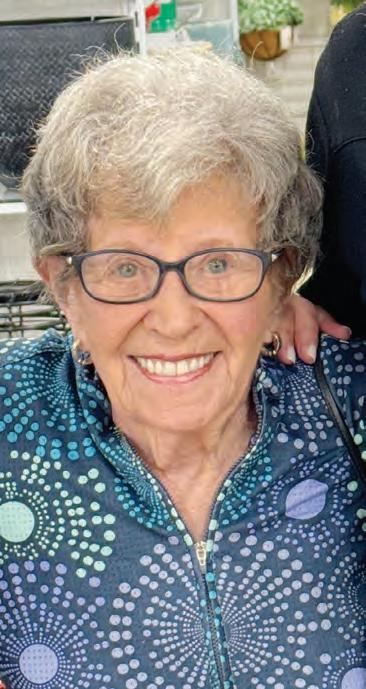
Betty Goldman Belle, 96, passed peacefully June 30, 2025, with her family and beloved Keaua close by. Betty was the loved, devoted wife of Edgar Belle. She is the beloved mother of Geri, Steven, Bob and Carolyn Belle, grandmother of Danny Balel, Molly Burman, Emily Belle, Michael Belle and Lara Egui, great-grandmother of Josephine Burman-Balel and beloved aunt to Mikey, Jay, Judy, Wayne, Jerry, Tracy, Van, Scott, Debra and Marc. Betty was loved by family and friends alike. She will be known for her generosity, curiosity, strong opinions, mischievous spirit, sense of fashion and fun. Betty Belle stories will be told for generations to come. She will be missed. Donations can be made to St. Jude’s (stjude.org) or hug a loved one today. Arrangements entrusted to Ralph Schugar Chapel, Inc. schugar.com
Claryne Cooper Berman, formerly of Steubenville, Ohio, passed away peacefully at age 93 on July 6, 2025 in Pittsburgh. The only child of the late Benjamin and Jeanne Cooper, Claryne was born on May 11, 1932, in Steubenville, Ohio, and graduated from Steubenville High School. She was preceded in death by her beloved husband of 67.5 years, Sanford W. Berman. She is the cherished mother of Stuart Berman of Los Angeles, California, and Elyse (Marty) Eichner of Pittsburgh; adoring grandmother of Alanna (Salomon) Maya, Mia Berman, Scott (Tracy) Eichner, Adam Berman, Max (Rachel) Eichner and Erica (Stephen) Pierce; proud great-grandmother of Jacob Maya, Milo, Oliver and Luca Pierce, and Miller Sophia Eichner. Services will be private. Donations in Claryne’s memory may be made to Sivitz Hospice & Palliative Care, part of the Jewish Association on Aging, 200 JHF Drive, Pittsburgh, PA 15217. Arrangements entrusted to Ralph Schugar Chapel, Inc., family-owned and operated.
Please see Obituaries, page 20
Mary Ann Wright a/k/a Mary Ann Wright, Deceased January 25, 2025, of Pittsburgh, Pennsylvania No. 02-25-0096
Brian J. Friday, Administrator; 1012 Amherst St., White Oak, PA 15131 or to Bruce S. Gelman, Esquire, Gelman & Reisman, P.C., Law & Finance Bldg., 429 Fourth Avenue, Suite 1203, Pittsburgh, PA 15219

Contact the Development department at 412-586-2690 or development@jaapgh.org for more information. THIS WEEK’S YAHRZEITS —
Sunday July 13: Leonard Bernstein, Minnie Bonder, Meyer Charapp, Rose Levy Ginsburg, Genevieve
Harriet Israel, Ethel Kwall, Helen N Lehman, Bessie Breman Osgood, Myer W Singer, Anna Sarah Stern, Samuel Trachtenberg
Monday July 14: Pearl I Berdyck, Hinde Leah Davidson, J Philip Esman, Adolph Hepps, Samuel Hilsenrath, Audrey Huber, Zetta Levy, Dora Marcus, Lawrence I Miller, Fanny Novak, Irving Rosenberg, Bessie Finkelstein Simon, Sidney Stern, Irene Taylor, Herbert Walker
Tuesday July 15: Leon Becker, Eli Bonder, Rose Esther Bonn, Albert Davis, Harry (Hershel) Fisher, Alice Foreman, Oscar Grumet, Samuel Halle, Samuel Hoffman, Leonard Joel Kirsch, Anna Kirshenbaum, John Kramer, Dora Levin, Dora Lipkind, Benjamin Riesberg, Sandra Platt Rosen, Lottie Stein Rosenthal, Nettie Rothstein, Mildred Stern, Burton Hill Talenfeld, Dorothy Zelda Wein
Wednesday July 16: Fanny Finesod, Maurice A Glasser, Beatrice Miller Kadas, Ellis A Kopelman, Maurice H Levine, Charlotte Levy Klevan, Lazar Litmans, Regina Ruth Keizler Mandell, Leah Rachel Miller, Ralph Moritz, Mollie Plotkin, Dolores Sheffler, Frank E Simon, Florence Stein, Sigmund Stern, Dr Lee Weiss
Thursday July 17: Sophie Weiss Arnold, Herman Berzosky, Stanley Bernard Blatt, Rose Bloom,
Ida Cartiff, Lena Garfinkel Cohen, Rebecca Darling, Louis L Friedman, M .D , Dorothy Goldston, Anna C Martin, John Mermelstein, Ida D Roth, Ethel Sachnoff, Zelda Shapiro, Morris Silverman, Elizabeth Pirchesky Sklov, Benjamin S Smith, Martin W Snow, Goldie Solomon, Bella Spolan, Rose Coffee Stein
Friday July 18: Alfonso Augustine Abbatiello, Morris H Barr, Florence Hoffman Caplan, Morris Goldstein, Bessie Harris, Dr Julius A Katzive, Neff Kruman, Fannie Lubarsky, Joseph Marcus, Leonard Wolinsky
Saturday July 19: Sam Burckin, Benjamin Cooper, Robert Davidson, Elizabeth Felser, Abe Finer, Charles J Goldberg, Diane Cooper Goldstone, Mary Goodman, Kenneth Israel, Beatrice Kohn, Lewis Leventon, Harry Lipner, Max Marcus, Joseph Mormanstein, Robert (Bob) Platt, Dr Jacob Daniel Schwartz, Ruth F Zeiden, Ben Zimet


In keeping with the tradition of honoring sacred texts, the Jewish Cemetery & Burial Association, in partnership with Ralph Schugar Chapel and Urbach Memorials, will be holding a Jewish book burial (Genizah) to respectfully lay to rest worn-out or damaged religious items.
We invite members of the community to drop o the following items for proper burial:
• Worn or damaged siddurim (prayer books)
• Chumashim, Tanakhim, and other holy books
• Tallitot, te llin, tzitzit
• Pages containing G-d’s name or Hebrew sacred texts
• Other religious items no longer in use
















DROP-OFF LOCATIONS:
Rodef Shalom Congregation Parking Lot August 3, 4, 5 (7:00 am - 8:00 pm)












4905 Fifth Avenue, Pittsburgh, PA 15213
Ralph Schugar Chapel - 412-621-8282 July 14 - Aug 7 (call for appt)
5509 Centre Avenue, Pittsburgh, PA 15232
For other possible drop-off arrangements, please call the JCBA at 412-553-6469.
The Community Book Burial will be at noon on August 10th at (New) Chesed Shel Emeth Cemetery, 498 Oakwood Street, Shaler Twp, PA 15209. MORE INFORMATION TO FOLLOW.



For more information about JCBA cemeteries, to volunteer, to purchase plots, to read our complete histories and/or to make a contribution, please visit our website at www.JCBApgh.org, email us at o ice@jcbapgh.org, or call the JCBA o ice at 412-553-6469.
Obituaries:
Continued from page 19
BLOCH: Joan Rosenbaum Bloch. “Joanie” was devoted to her family, her friends, her Murdoch Road and US2 neighbors, Rodef Shalom and all communities of which she was a part. She was a true Pittsburgher. She graduated from Taylor Allderdice, then the University of Pittsburgh. She was a loving wife to her late husband of 64 years, “Buzzy,” and a wonderful mother and grandmother. She cared about everyone who came into her orbit. Joanie enjoyed reading, Broadway musicals, theater productions, cooking, catching up with friends and family, walking with Buzzy through Squirrel Hill, as well as strolling on the beach in Michigan. She loved cheering on Pittsburgh’s sports teams, especially the Steelers! She was happiest when she brought groups of people together. Joanie is survived by her two children, James (Rachel) and William (Ingrid), and four grandsons, Jeremy, Dylan, Levi and Nicholas, who lit up her life. The Bloch family extends a heartfelt thanks to those who supported and cared for her this past year: her care professionals from Honor, and the staffs at The Willows, Weinberg Terrace and Sivitz Hospice. Graveside service and interment were held at West View Cemetery of Rodef Shalom Congregation. Contributions may be made in Joanie’s memory to the Pittsburgh Chapter of the Jewish Association on Aging (jaapgh. org/donate/) or the Rodef Shalom General Fund (rodefshalomcongregation.shulcloud.com/ payment.php). Arrangements entrusted to Ralph Schugar Chapel, Inc. schugar.com
LABY: Gilda R. Laby, on June 29, 2025. Age 90. Beloved wife of the late Lawrence Laby. Loving mother of Arthur Laby (Rachel) and the late Jason Laby (Jodi). Sister of the late Shirley Gottfried (Norman). Cherished grandmother of Jonathan Laby, Michael Laby, Sonia Laby and Ethan Laby. Also survived by many beloved cousins and family members. The daughter of Julius and Ida Radbord, Gilda was raised in Squirrell Hill with many family members living within a few blocks. She kept strong family ties throughout her life, including
Melbourne protesters chant
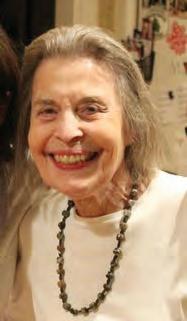
hosting numerous relatives, neighbors and friends for holidays — all were welcome, even when they divided between “first shift” and “second shift” for meals. Gilda was a wonderful cook and baker, and the coffee was always hot and fresh, long before the advent of Starbucks. She was a good listener and many used her as a sounding board, spending hours at her cherished white kitchen table sharing secrets or seeking advice. She graduated from Pitt, married and became a teacher. After raising two boys, she reentered the working world. She dabbled in calligraphy, became a volunteer docent at Hartwood Acres, and eventually opened her own jewelry and gift store in Station Square. She was loyal to Pittsburgh. She held season tickets to the Pittsburgh Symphony for many decades, was a lifelong member of Carnegie Museums and was a dedicated Pittsburgh Penguins fan. She had strong values and quietly tried to instill them into those around her. She saw the best in everyone; she appreciated and valued their merit and their accomplishments and was quick to overlook their foibles. Family was her first priority. She was fiercely devoted to her sons and adored her four grandchildren. She spoke often about her beloved parents, her sister, her many aunts, uncles and cousins, and how much they meant to her growing up together in or near Pittsburgh. Contributions can be made to Congregation Beth Shalom or to Allegheny County Parks Foundation, with a direction to Hartwood Acres. Graveside service and interment were held at Beth Shalom Cemetery. Arrangements entrusted to Ralph Schugar Chapel, Inc. schugar.com PJC
‘Death to the IDF’ days after attacks on local synagogue, Israeli restaurant
By Philissa Cramer | JTA
Pro-Palestinian demonstrators in Melbourne, Australia, chanted “Death to the IDF” at a rally Sunday, two days after a spate of violent attacks on Jewish targets including a synagogue and businesses with ties to Israel.
Local police ramped up their presence at the rally after the attacks Friday night, which included the arson of a synagogue while more than 20 Jews were gathered for a Shabbat dinner inside.
Police arrested one man in connection with the arson, which resulted in damage to the East Melbourne Synagogue building but no injuries. In addition to the arson — the second at a Melbourne synagogue in seven months — a weapons business was vandalized with anti-Israel graffiti, and more than 20 people stormed an outpost of the Miznon chain owned by the Israeli chef Eyal Shani, some shouting “Death to the IDF” in the process.
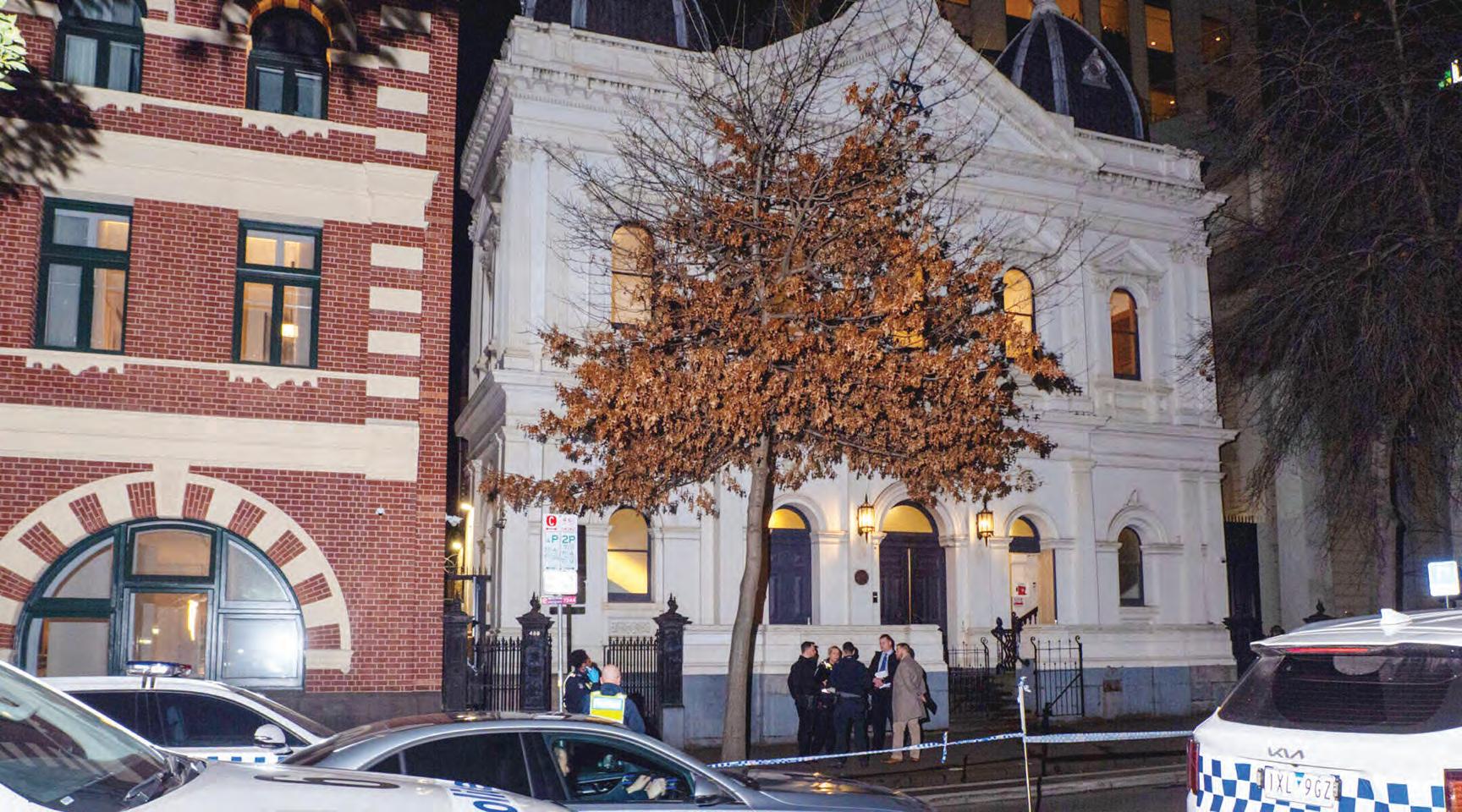
The phrase has vaulted into prominence since the punk band Bob Vylan chanted it at the Glastonbury festival in England last week.
Both Miznon and the business, Lovitt Technologies, have been targets of Melbourne’s robust pro-Palestinian movement because of their ties to the Israeli military and its war in Gaza.
Lovitt Technologies works with the Israeli army, according to local media reports. And Shani’s business partner, Shahar Segal, was serving as a spokesperson for the controversial Gaza Humanitarian Foundation, which the United States and Israel set up in recent months to deliver aid in Gaza; it has drawn criticism for exposing Palestinians
to violence while they wait for food distributions. He announced on Instagram on Sunday that he had exited the position, which he said was always intended to be temporary.
The synagogue arson ignited particular fear among local Jews and condemnation from authorities in Australia and beyond.
“Last night’s arson attack in East Melbourne is cowardly, is an act of violence and antisemitism, and has no place in Australian society,” Prime Minister Anthony Albanese said on Saturday. He vowed to bring “the full force of the law” upon anyone involved in the attacks.
“I condemn outright the vile arson attack
targeting Jews in Melbourne’s historic and oldest synagogue on the Sabbath, and on an Israeli restaurant where people had come to enjoy a meal together,” said Israeli President Isaac Herzog, one of several Israeli officials to make statements calling on Australia to do more to fight antisemitism. He added, “It is intolerable that in 2025, we are still faced with the chilling image of an attempt to burn Jews alive as they pray.”
Australian Jews have been on high alert amid widespread antisemitic incidents and tensions since the start of the Israel-Hamas war on Oct. 7, 2023. Police in Melbourne evacuated a synagogue during Shabbat
services in 2023 out of concern that a demonstration nearby would spill over into violence. And Adass Israel, a synagogue in a Melbourne suburb, was set ablaze in December, amid a flurry of attacks on Jewish targets. Police believe at least some of those incidents were the work of criminal gangs. A speaker at the Melbourne rally denounced the synagogue attack, according to the Sydney Morning Herald, which reported that a source within the pro-Palestinian movement said the storming of Miznon “ruins public opinion — they do it in Palestine’s name and not one Palestinian was there.” PJC

Contact me today to discuss all of your real estate needs!
Sherri Mayer, Realtor Squirrel Hill Office
C: 412-760-0412 O: 412-421-9121x225 sherrimayer@howardhanna.com HowardHanna.com



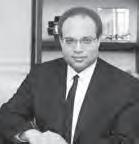





Smith-Rosenthal Team
Jason A. Smith & Caryn Rosenthal
Jason: 412-969-2930 | Caryn: 412-389-1695 Jasonasmith@howardhanna.com Carynrosenthal@howardhanna.com












































By Asaf Elia-Shalev | JTA
AConservative synagogue in Minnesota has become the first in its denomination to allow its clergy to participate in — but not officiate — weddings of Jews who marry outside their faith.
Rabbis and cantors at Adath Jeshurun Congregation, a large synagogue in suburban Minneapolis, can now offer blessings, teachings and music during wedding ceremonies for intermarrying couples, as long as the ceremonies do not feature rituals from religions other than Judaism.

“We hope we can play a role in being a living lab for the movement and working for change from within the system as a USCJ congregation,” he said.
t’s not the first time Adath Jeshurun has put itself at the forefront of denominational change. Many decades ago, it was among the first Conservative congregations to allow girls to have a bat mitzvah, an initiation ritual previously reserved for boys. In 2023, when Weininger assumed his current position, he became the first openly gay person appointed to the position of senior rabbi at a large Conservative synagogue.
chart a middle path.
But as the movement enters the next phase of its debate on intermarriage, it will do so without the leader USCJ hired in 2020 to focus on the issue. As part of a budget reallocation, USCJ recently eliminated the position of director of intermarriage engagement and inclusion, leading to the layoff of Keren McGinity. A part-time racial justice and inclusion specialist position was also cut.
McGinity is not currently giving interviews. In a Facebook post, she noted that Adath Jeshurun’s announcement coincided with her final day.
Such weddings would take place outside the synagogue and be officiated by someone who is not clergy, such as a friend, relative or judge.
Announced last week, the policy change was supported by the congregation’s board and signed by the congregation’s two rabbis and two cantors, including Joanna Dulkin, who is the immediate past president of the 600-member Cantors Assembly, the professional association for Conservative cantors.
The goal is to make the congregation of some 1,100 households more welcoming and inclusive while recognizing that intermarriage is a common reality among congregants and American Jews at large, according to Adath Jeshurun’s senior rabbi, Aaron Weininger.
“We see Conservative Judaism as offering
Photo by Burke/Triolo Productions via Getty Images
nuance at a time when there are so many binaries, and this gives us a path forward to make sure everyone is seen and heard and welcomed into our community,” Weininger said.
About 42% of married American Jews have a non-Jewish spouse, with the intermarriage rate reaching about 60% for those who have wed since 2010, according to a 2020 survey by the Pew Research Center.
The move by Adath Jeshurun’s leadership marks a deliberate departure from the stricter standards long upheld by the Conservative movement and its rabbinical association, known as the Rabbinical Assembly.
Weininger said the decision was reached through a public process with multiple listening sessions and after regular communication with the leadership of the United Synagogue of Conservative Judaism, the denomination’s umbrella organization.

Adath Jeshurun’s announcement comes as the Conservative movement weighs how to move beyond a history of treating intermarriage as a threat to Judaism, without forsaking its traditional grounding in Jewish law.
In a report released last year, the Rabbinical Assembly reaffirmed its ban on clergy officiating at weddings of intermarrying couples but called on members to be more welcoming toward mixed families. Since then, a working group with representatives from several Conservative movement bodies has been studying the issue and is expected to release its findings later this year.
In response to Adath Jeshurun’s announcement, Conservative leaders said they are awaiting the guidance that will come from the working group.
“When that work is complete in the coming months, it will inform our professional and lay leadership as they work with congregations like Adath Jeshurun to determine the appropriate path forward, aligned with the movement’s policies and values,” Andy Schaer, president of USCJ, and Rabbi Jay Kornsgold, president of the Rabbinical Assembly, said in a statement.
Their statement was conciliatory in tone, acknowledging the significance of the issue Adath Jeshurun is seeking to address.
“We fully recognize that disapproval has too often discouraged intermarried couples and their families from being part of our synagogue communities and building relationships with our clergy,” it read. “Today, we are, instead, focused on fostering a positive vision of Conservative/Masorti Judaism that encourages commitment, creativity, and inclusivity.”
There are a variety of approaches to intermarriage across Jewish denominations. The Reform and Reconstructionist movements permit it, while Orthodox Judaism strictly prohibits it — leaving Conservative Judaism to
Continued from page 17
has embraced the spirit of those earlier teams — the pride in representing Israel. Talent goes far, but when you combine that with a relentless passion to represent your country, that becomes a powerful force.”
Many may not realize that flag football is played in Israel — let alone by women — but this team is part of a growing movement of female athletes gaining attention across various sports.
“Women’s flag football, like all women’s sports, is having a moment — and we’re doing everything we can to make the most of it. We have a core group of driven, motivated female athletes who are not only honored to represent Israel but are also dedicated to growing the sport,” Sagoskin says.
With a much smaller talent pool than the
“May the Adath clergy and community go from strength to even greater strength,” she wrote. “I can’t think of a post I’d rather read on my last day serving as Director of Intermarriage Engagement and Inclusion.”
Rabbi Jacob Blumenthal, the CEO of USCJ, said in a letter to synagogue leaders in May that his organization remains committed to intermarriage engagement, albeit under a “different staff structure.”
The Conservative movement used to forbid its rabbis from even attending intermarriage ceremonies. That ban was lifted in 2018, after 40 years, by a vote of the Rabbinical Assembly’s Committee on Jewish Law and Standards, which sets the movement’s interpretation of Jewish law.
By now, it is an open secret that some of the 1,600 rabbis belonging to the RA officiate at weddings of intermarrying couples. The RA has expelled some rabbis for flouting the ban, and others have left over the issue.
The policy change at Adath Jeshurun falls short of permitting officiation. Weininger said the congregation did not believe it could justify that move.
“The part of the wedding ceremony known as kiddushin that says, ‘you are betrothed to me according to the laws of Moses and Israel,’ does not apply to a couple in which one partner has not affirmed that covenant,” he said.
He also said the goal was to invite “as much buy-in as possible” and to encourage change throughout the movement.
Still, he acknowledges that both he and Adath Jeshurun are going against the rules and could face repercussions.
“My sense is that USCJ wants to hear different points of view, and I’m hopeful that our process — which has involved as many voices as possible — will be welcomed,” he said. “We hope to work for change within the system. It’s ultimately their decision how to respond.” PJC
men’s program, the women’s team is working hard to identify new players. Their strategy has three pillars: focusing on local youth development, recruiting top athletes from other sports, and reaching out to talented Jewish players abroad who are open to making aliyah and representing Israel.
Representing Israel, she says, is unlike anything else.
“One of the greatest privileges of making aliyah is the opportunity to represent Israel in international sport,” Sagoskin said.
Sagoskin is encouraged by this new generation of players.
“We’re growing the sport, and we have some phenomenal athletes who are determined, passionate, and resilient. They understand that they’re not just representing themselves or the team — they’re also representing the sport, the country, and the whole Jewish people.” PJC
Pittsburgh educators and local leaders met Poland’s Chief Rabbi Michael Shudrich at Nożyk Synagogue during a nine-day study seminar with Classrooms Without Borders. Participants of the Poland Personally seminar explored Łódź, Kraków and Warsaw (one of Pittsburgh’s sister cities through the Jewish Federation of Greater Pittsburgh’s Partnership2Gether program) while focusing on a millennia of Jewish history, the Holocaust and post-War responsibilities.
All together now
Rodef Shalom Congregation hosted its first official unified Shabbat with Temple Sinai. The July 4 gathering was led by Rabbi Daniel Fellman, Rabbi David Young and Cantor



A partnership between Shaare Torah Congregation and the Kollel Jewish Learning Center brought nearly 20 people to daily morning study sessions. Scheduled Monday-Friday at 6 a.m.. the program features chavruta-style learning along with insights by Shaare Torah’s






















